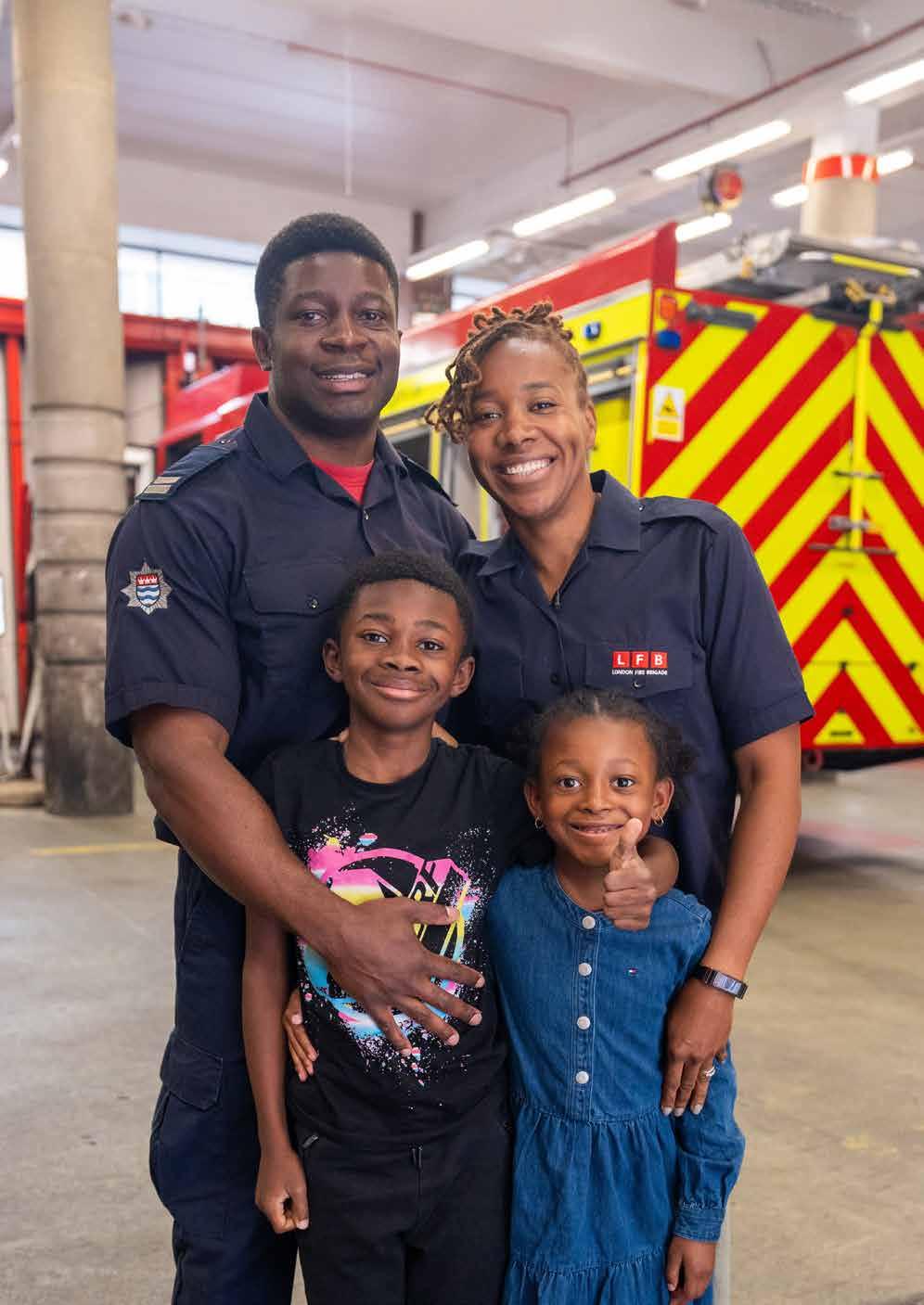

Message from our Chief Executive
People who work in Fire and Rescue Services do far more than fight fires. They respond to floods, major disasters, terrorist incidents, chemical and radiological hazards, road traffic collisions, civil unrest, urban search and rescue, dangerous structures, and increasingly, medical emergencies such as cardiac arrests, alongside paramedics.
Working in the UK fire and rescue community brings unique health and wellbeing challenges. Firefighters, control operators and support staff run towards danger, often at great personal cost. Their work has profound physical, psychological, social and financial impacts on they and their families. Transition into retirement can be especially difficult, with many experiencing depression, isolation, loneliness and strained relationships. These challenges can last a lifetime and, tragically, this community continues to experience losses to suicide.
Although HMICFRS works with Services to ensure people working in Fire and Rescue are safe and well, significant gaps remain. Barriers such as stigma, fear of judgment and limited access to tailored support prevent many from receiving the timely healthcare and wellbeing support they need during and after service.
Thanks to your generosity, in 2024/25 we supported 10,267 people - a 7% increase on the previous year. Yet we know the need is far greater. As firefighter numbers decline under funding pressures, demand for our services is rising. Health and wellbeing needs are changing, and the complexity of that need is increasing, even as the fire sector

grapples with the impacts of changing geopolitics and significant rises in major incidents resulting from the climate crisis, such as wildfires and flooding, and this is on top of the wider challenges with access to healthcare in the NHS and statutory sector.
I’m proud of the work my colleagues, our volunteers and our partners - including all Fire and Rescue Services across the UK - have done this past year to enable more people to access our care and support. We have all poured boundless energy and passion into being there when it matters most for those whose courage and sacrifice is boundless.
Yet we simply have not been able to rise to meet the demand for our care and support fast enough and as a charity, we recognise we need to do more. Our medium-term Strategic Plan sets out our ambition to double our reach by 2027/28 while remaining impact-led, costeffective and true to our high standards of care. 2024/25 marked the first year of delivery against this plan, during which we restructured and improved the way we work to better meet demand.
Our services help individuals manage the health impacts of service, recover from illness or injury, stay fit for work, and adapt to life after retirement – often preventing loneliness, hardship and isolation. A feature of our work that I’m immensely proud of is conducting, collaborating and participating in research on health and wellbeing needs
within the fire services community to influence and inform provision by the charity and others. This is all so that we can ensure services, resources and good practice are shared and adopted to meet the evolving needs of our fire family.
Our teams understand the unique challenges people in the fire services community face, and are ready, willing and able to help. Yet the external environment in which we operate continues to test us - economic conditions across the UK mean we are challenged to raise adequate funds for our service delivery, even as the value of every pound we raise is being eroded by inflation and rising costs.
In line with our Strategic Plan to 2027/28, and together with our supporters, my colleagues and our partners, we will work to increase our income relative to costs and improve our service delivery so we can help many thousands more people who need our care and support. This includes for example, working to broaden, strengthen and simplify our digital self-access tools so that we can alleviate the immediate needs of many thousands more individuals.
Thank you for everything you did to support the health and wellbeing of our fire family in 2024/25 – whether that was through your incredible fundraising efforts as individuals, teams, watches or stations, by playing our lottery, leaving a gift in your will or simply by choosing to holiday in one of our properties. Your kindness and support has enabled thousands of members of the fire services community to cope with the health and wellbeing challenges they have faced because of their service. They deserve this and so much more.

Sherine Wheeler Chief Executive

Message from our Chair
The health and wellbeing of our fire services community lies at the heart of all that we do at the Fire Fighters Charity.
My heartfelt thanks to everyone in our extended family for your part in a very busy and successful year. This charity continues to respond to a growing need for our services, and it provides innovative, life-changing support carefully tailored to each and every individual’s needs. It’s about being there with the compassionate, competent, knowledgeable and personalised care, together with our support and resources, that will help people cope with the physical, emotional and social impacts of service.
Our Strategic Plan 2024/25 – 2027/28 charts a clear plan to scale our reach and be there for more individuals who need and deserve the care and support we provide. And our plan is working. We have temporarily changed the way we are organised so that we have the capability and capacity to accelerate delivery against our goals and we have made huge strides this past year in developing relationships and partnerships with a wide range of organisations so that we can collaborate to increase reach and deepen the impact of our work.
The responsibility is on us now to evolve and reposition this wonderful charity, so that more people who need our help can get it. We are working hard to become even more relevant and accessible than ever before, adapting our service offering and the way we communicate with our service users, supporters and the public.
I extend my thanks to all of our supporters, including our company members, life patrons and volunteers, who make our vital work possible through their generosity with time, money and energy to fundraise, donate, volunteer and raise awareness of our work. My sincere thanks also, on behalf of the Board of Trustees, to all the charity’s staff for their incredible hard work and commitment over the past year, even as this was a period of transition and change.
Over the coming pages, you will see just how your support has enabled our talented and passionate teams to deliver services that are a lifeline to those who have served in fire.

John Baines Chair of Board of Trustees
Photo creditDavid Easton
10,267
2,139
1,339
144
5,180
200 calls to our Crisis Line were handled by members of our community experiencing suicidal ideation - ensuring critical, compassionate support during moments of crisis
1,913
1,164
760
21,536
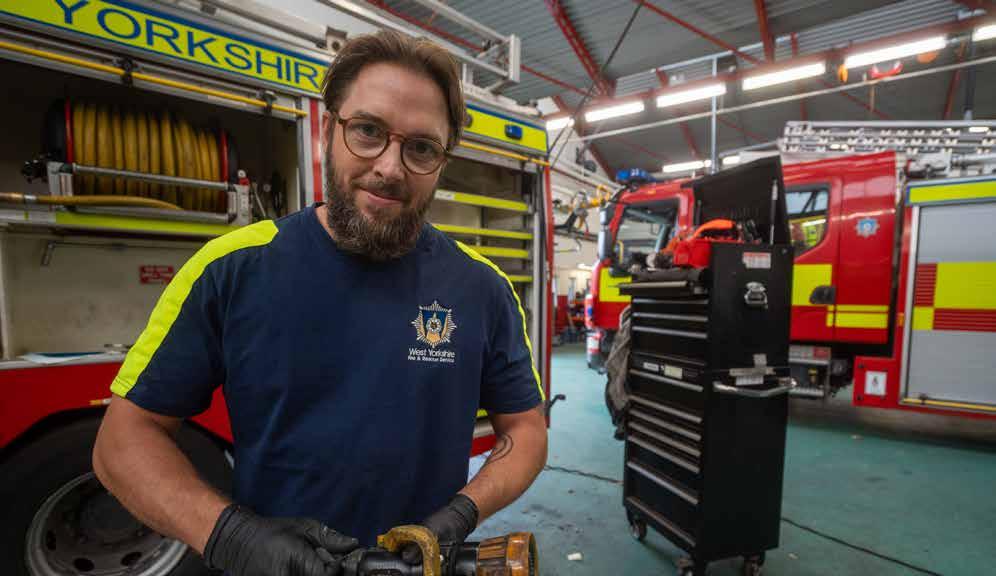
Everyone who has served their communities by working in the fire service deserves to live well and to feel valued and recognised for their contribution. There are many health and wellbeing challenges people face during and after a career in fire, be they firefighters, control room operators or support staff. Through our Strategic Plan 2024/25 – 2027/28, we are striving to improve and develop our services, so that we can reach many more people in the ways that are most relevant and accessible for them. We are working hard to increase and diversify our income relative to the costs we bear, to develop partnerships and relationships that will help us amplify our reach and impact and improving the ways we think and work as a charity.
Our goal at the end of 2027/28 is to be able to reach at least 20,000 people each year with our care and support, and to do so while improving our underlying financial performance.
Strategic priorities
We will achieve this by delivering against four strategic priorities:

Our Outcomes
We champion the fire service community and help its members with their health and wellbeing, during and after service, so that we’ll have a society where every member of the fire service community lives well and feels valued and recognised.
Through our clinical care, wellbeing support, practical support, information and advice and research, our service users experience the following key outcomes:
Manage the impact of service:
Individuals and their families are able to manage the impacts of service and avoid poor or poorer health and wellbeing outcomes
Adapted to condition/injury/ illness: Individuals and their families are able to manage the impacts of a health condition or injury or illness
Access to timely care and support: Individuals and their families have access to the timely health care and wellbeing support they need
Fitness to work: Individuals and their families are well enough to work
Life after service: Individuals and their families adapt to life after service, avoiding loneliness, hardship and isolation
Valued and recognised: Individuals and their families feel appreciated and understood for their contribution to communities
Good practice is adopted: Conducting, collaborating and participating in research on needs in the fire service community mean we influence and inform services, resources and best practice to meet the evolving needs of our fire family
Tailormade help for all
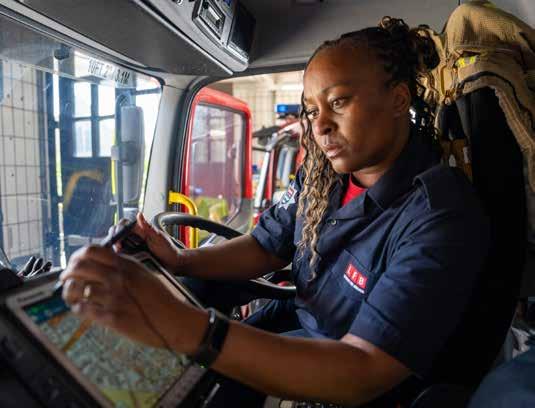
The
impact of fire service life doesn’t stop at the end of a shift – and neither does our support. Every day, we stand alongside the UK’s fire services community, providing care and support that meets them where they are and helps them move forward. Whether they’re recovering from injury, facing emotional strain, or navigating life after service, we tailor support to their individual needs – listening first, then acting with compassion and expertise.
Week in, week out we listen to the lived experiences of those in our fire family. Their insights, along with the input of colleagues across fire services, helps inform the continuous development of our services and to better reflect the evolving needs of the people we support.
One of the key ways we’re ensuring this happens is through our Service User Experience Panel - a group of individuals from our fire services community who bring valuable experiences and perspectives, offering meaningful feedback that helps shape how we design and deliver support. Alongside the Panel’s input, we continue to work closely with Fire and Rescue Services across the UK to ensure our services meet real-world needs and challenges.
Our approach is built on delivering proactive, preventative care and holistic wellbeing support, while also being there to respond and support those managing injuries, illness and conditions. In 2023, we saw a marked increase in the complexity of the cases we’re dealing with - highlighting a growing need for accessible, personcentred support that intervenes early and effectively.
Sharon Bailey, our Director of Services, explains:
“Over the course of the past year, we’ve responded to increasingly complex challenges presented by those we support. That’s why it’s more important than ever that we invest in services that don’t just
treat issues as they arise, but aim to both manage them as well as possible, and prevent them altogether, through early intervention.
“Our model of care is continually shaped by what we hear every day from our service users and from Fire and Rescue Services. These real-time insights are invaluable, helping us to refine and evolve our tailored approach across physical health, mental wellbeing, and practical support.”
This year, we’ve also enhanced our understanding through wider sector collaboration. Having previously launched a joint research report with the National Fire Chiefs Council and Nottingham Trent University, looking into the health and wellbeing experiences of over 3,000 Fire and Rescue Service personnel, we have continued to explore further research to provide a broader context to the challenges our community faces and support the direction of our own services.
“It had been really difficult on everyone, watching me struggling, so I was very aware they were in need of a break too. It was absolutely amazing, I can’t praise it enough.”
Iwan Ward, on-call firefighter, Mid and West Wales FRS
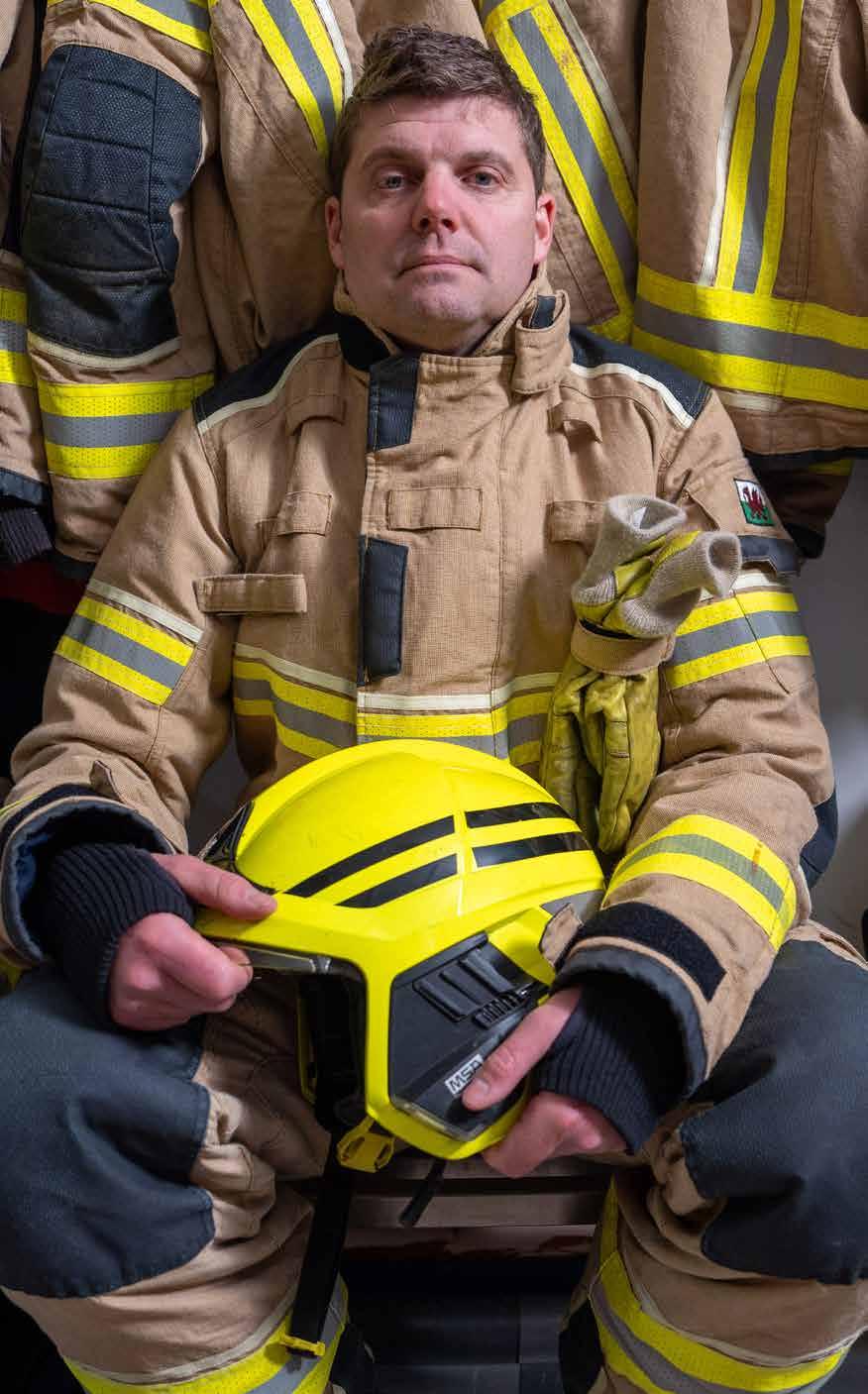
Read Iwan’s full story.
Read
Sophie’s full story.

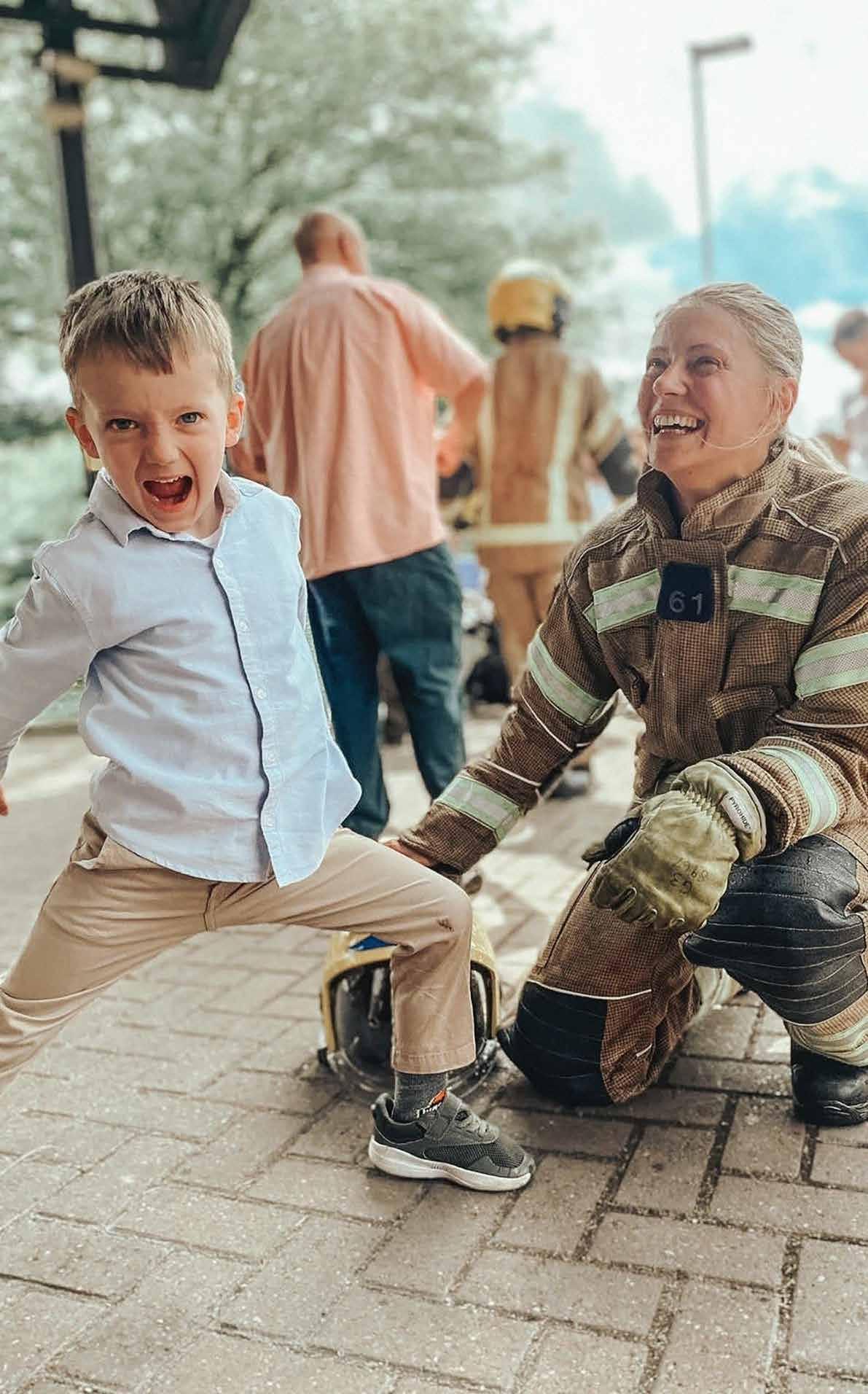
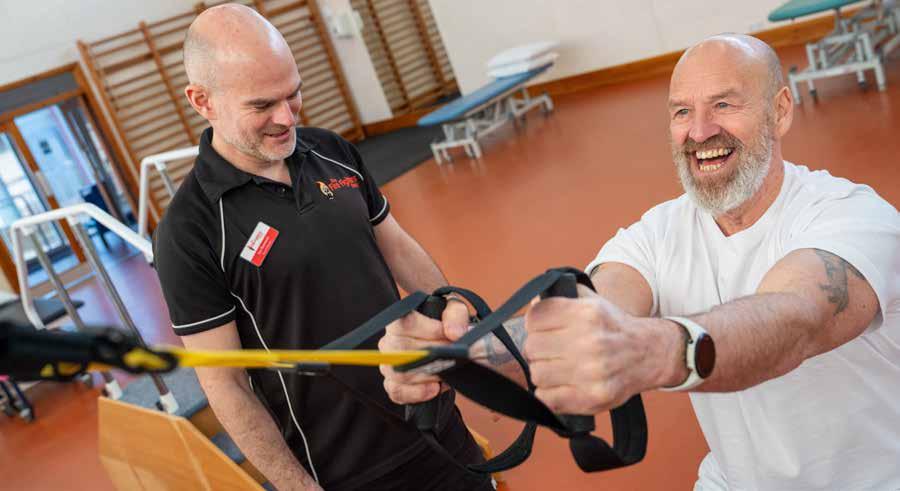
Support that works
Behind every call, message, or visit is someone seeking support they can trust. That’s why we don’t just deliver services – we build personal pathways to better health and wellbeing.
Clinical care
“I left with the confidence to return to full duties and a positive outlook on my future. I will be forever grateful.”
Sophie Hodgson, firefighter, Hampshire and Isle of Wight FRS
Wellbeing support
Practical support
Information & advice
Research
Because no two lives look the same, our support is always flexible, always tailored, and always rooted in a deep understanding of the fire services community. We offer specialist support built around the lives, needs and goals of the individuals and families we’re here to help.
At the heart of this approach are five interconnected pillars of support:
• Clinical care - Supporting individuals with their mental health, physical health, and nursing needs, provided through one-to-one and group-based interventions both digitally and within the residential setting.
• Wellbeing support – Helping individuals improve their mental, emotional, and physical wellbeing, build their resilience, and develop effective self-care and coping strategies.
• Practical support – Supporting individuals through financial assistance, funding for essential aids and adaptations, and the provision of welfare-related advice.
• Information and advice – Empowering individuals with knowledge and information, guiding them to access the support they need to move forward.
• Research – Using research and insight to increase public awareness and understanding of the fire community, and guide the development of our services.
Together, these pillars form the foundation of everything we do, from in-person support at our centres, to digital services for those who need help closer to home.
As Sharon Bailey, our Director of Services, explains:
“Whether someone’s recovering from injury, navigating a mental health challenge, or facing a period of uncertainty, we are here to support them through difficult times.”
Throughout 2024/25, we supported thousands of individuals and families, delivering services that focus on prevention, early intervention, and lasting recovery and resilience. We have also been a source of support for those facing ongoing health challenges. As demand continues to grow, we remain committed to listening, learning and evolving –working with our research partners and service users to ensure our services continue to deliver meaningful, measurable impact for our fire family.
Care for body and mind

When life’s challenges become too much, our support is caring, compassionate and without judgement.
From our 24/7 Crisis Line to residential Reset Programmes, we create safe spaces for people to feel heard, understood and supported as they build strength and resilience, one step at a time.
Supporting physical wellbeing
Through our centres and online, our in-person teams have supported our fire family’s physical wellbeing in a wealth of ways over the course of the last year:
• 2,139 individuals benefitted from physical care and support.
• 5,180 digital consultations allowed service users across the UK to access real-time physical or psychological support at home or on their mobile devices.
• 1,341 individuals received physical support at one of our centres, which included dedicated weeks for those with particular health needs, notably individuals still affected by Covid and those experiencing joint issues. Our successful Kickstart Programme, for example, supported 54 attendees across nine programmes.
• 270 service users attended one of our centres as an Outpatient, accessing face-to-face support, with a total of 994 sessions throughout the year.
Crisis and mental health support
Whether providing a 24/7 lifeline for those at the lowest point of their lives, or running specialist residential weeks for people impacted by trauma, we’ve helped hundreds to build mental strength and resilience this year.
• Between April 2024 and March 2025, we received 200 calls to our Crisis Line, over half of which were from individuals experiencing suicidal thoughts or had a plan in place.
• 1,339 individuals received psychological care and support from our teams.
• 418 individuals attended a Reset Programme at one of our centres, giving each the chance to work through feelings of stress and anxiety.
• Dedicated weeks within the Programme focused on improving wellbeing and building resilience, and also supported individuals navigating the changes of menopause.
• The Suicide Prevention and Postvention landing page for our resources was viewed by 760 people.
Nursing care boost
Our dedicated nursing team at Jubilee House – rated Outstanding by CQC – works tirelessly to support service users, using their skills, experience and compassionate nature to ensure all those accessing the service receive the care they deserve.
• Throughout the year, we were delighted to support 144 individuals at Jubilee House with tailored residential nursing care. This support focused on helping them manage the impact of their illness or injury, improve or maintain their independence, and enhance their quality of life.
• Our support also enabled their carers to have valued timeout from their caring duties, allowing them the time and space to improve their physical and mental wellbeing.
• We also developed and adapted our FaME (Falls Management Exercise) Programme through 24 online weekly sessions and three residential weeks.
• In June 2024, the Wolfson Foundation awarded us a grant of £60,000 towards the refurbishment of our nursing rooms, allowing us to further improve the support we can offer to our service users.


A word from:
Darcy Williams, Internal Communications Officer with Lancashire FRS
Darcy attended one of our Reset Programmes to find some balance in her life during a difficult time.
She said: “We all got on so well and have stayed in touch since. The type of conversations we had, both as a group and in the sessions, were so open. I felt more comfortable talking about women’s health in that setting.
“The amount of times we all cried together… it just felt completely comfortable.”
Meet the Team: Daisy Rubinstein, Psychological Therapist:
“Over the last year we have seen just how vital the crisis line is – it’s been a lifeline for many, a vital connection – a confidential, immediate source of support in their darkest hours. Whilst the crisis line provides ‘in the moment support’, it also provides stability and ongoing support through a five-session Collaborative Approach to Managing Suicide (CAMS) support programme, tailored for people experiencing suicidal thoughts.”
Read
Helen’s full story.
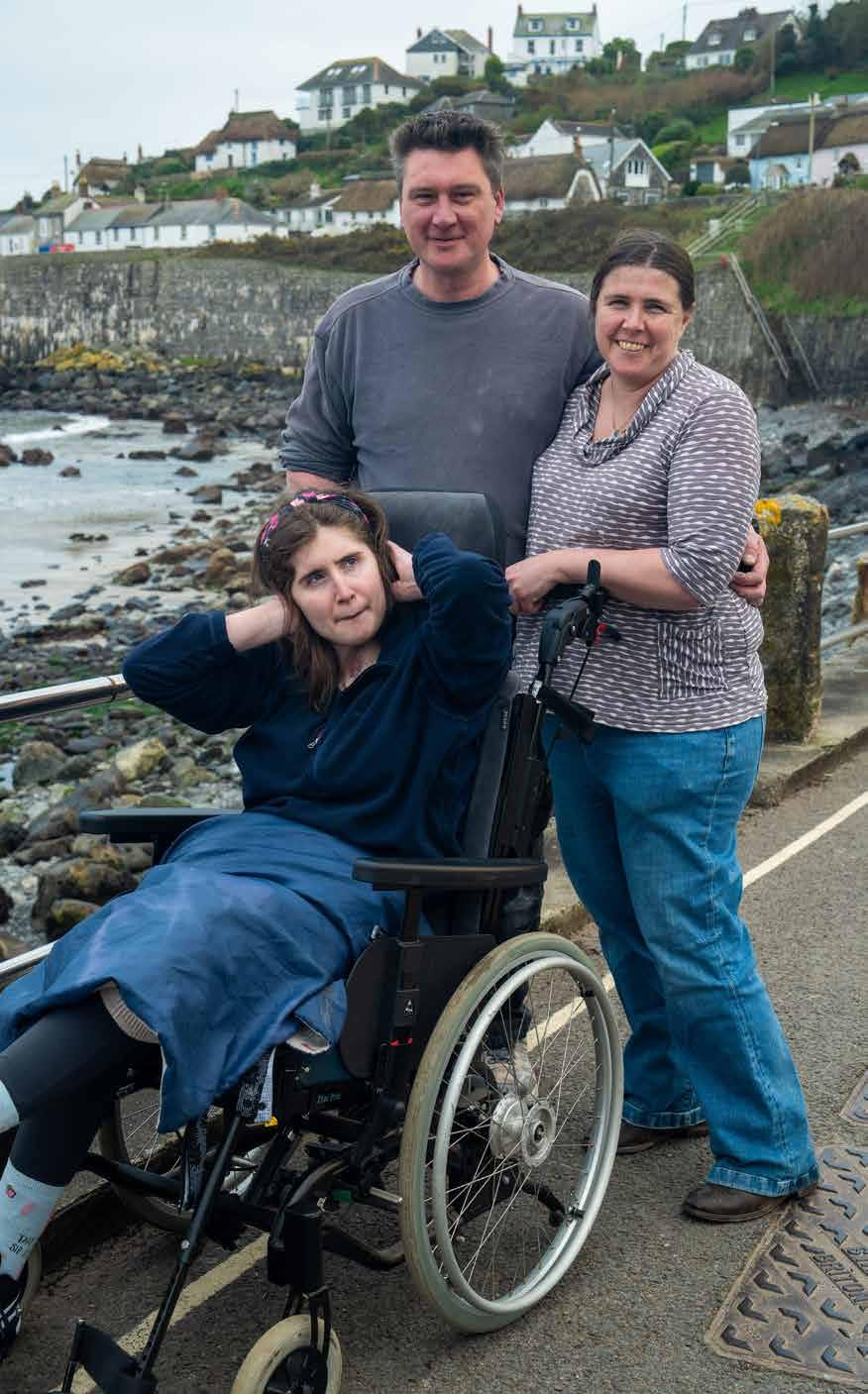
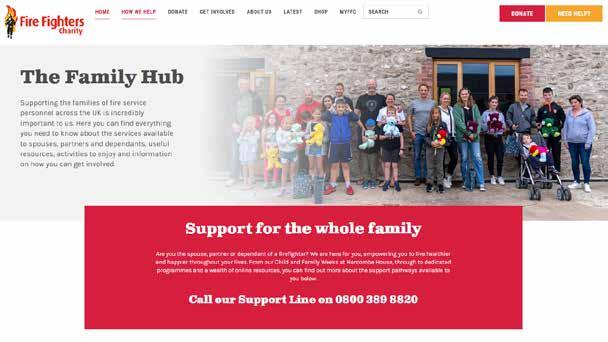
Putting families first
Being part of the fire services community often means giving a lot – to colleagues, to communities, to the job. But behind every firefighter or control room operator is a family navigating those same pressures. That’s why our support doesn’t just centre on individuals – it’s designed to keep families strong, connected, and resilient through life’s toughest moments.
Families weeks
Over the past year, we’ve expanded and evolved our family support offering to better meet these needs. Our targeted Families Weeks, held throughout the year, are designed to provide a supportive break, targeted to specific needs.
• Nine families weeks were held across the year at Harcombe House, including two pre-school weeks, two single parent weeks and one young dependants week, attended by 79 adults and 84 children.
Rest and Recharge
Our Rest and Recharge stays at all three centres continue to provide opportunities for individuals, couples and families to rest and reconnect during challenging times, for example when dealing with unforeseen events or emergencies, or through a difficult period in their life.
• 1,913 individuals, including family members and carers, attended one of our centres on a Rest and Recharge stay or Family Week in 2024/25.

A word from:
Nikki Bridges, a wholetime and on-call firefighter with Hampshire and Isle of Wight FRS
Nikki shared how attending one of our weeks dedicated to single parents at Harcombe House was an incredible way of connecting her to like-minded others:
“The Family Week was amazing, we haven’t had those experiences before. Ruby’s 18 months old, so for her seeing alpacas for the first time and handling animals, crafts and painting… everything was so much fun.”

“You offered respite and financial aid after my daughter suffered a traumatic brain injury… the physios were amazing, they had a great understanding of neuro disability which is rare.” Helen, Adam and Holly Martin, Cornwall
• Events for families during these weeks included music, arts and crafts, handson animal sessions and nature walks.
• This year we introduced a wider range of age-appropriate activities at Harcombe House – from gentle nature walks to arts and crafts, swims and bushcraft - ensuring everyone, from young children to older family members, gets the most out of their Rest and Recharge stay with us.
Online tools and resources
Our support also extends beyond centre stays. Throughout the year we continued to develop our online Family Hub, as well as providing accessible resources on wellbeing, grief support, and suicide postvention. These digital tools ensure families have access to the help they need - whenever and wherever they need it.
• 2,743 people visited the Family Hub on our website
• 415 people visited our grief support and guidance page on our website
Meet the Team: Jason Stone, Welfare Caseworker:
“We’ve continued to develop and adapt our support for families over the last year and, in addition to our specific Family Weeks, we’ve also focused on providing more activities on Rest and Recharge stays during summer school holidays. This ensures there’s support available for families to enjoy a well-earned break – and we’ve already received fantastic feedback.”

Helping our retired community thrive from the start
Our support doesn’t stop when life in the fire service ends. The transition into retirement brings a whole new set of challenges – and opportunities. We’re here to make that transition smoother, more supported, and full of possibility. Through our care and support, as well as our commitment to combatting isolation and loneliness, we’re helping retired members of the fire family to live well and feel recognised.
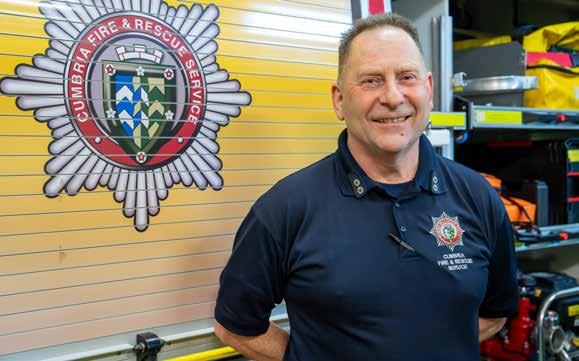
2024/25 saw us receive our second year of funding from the Wimbledon Foundation, helping us to grow and strengthen our retirement services. Their support is focused on three key areas: developing evidence-based pre-retirement coaching programmes, running residential support programmes and providing follow-up support after retirement.
In 2023/24, we launched the first two areas of work, and throughout 2024/25, we’ve continued to build on this foundationreaching more people and using what we’ve learned to refine and improve the support we offer. This has included:
Online HOPE Programme for retirees
We piloted a retirement-specific HOPE (Help Overcome Problems Effectively) Programme, alongside the existing online wellbeing programmes we already offer, specifically to support those navigating the transition to, or with recent experience of, retirement. Completely flexible, the programmes are designed to fit into busy schedules – via PC, laptop, tablet, or phone.
• We had a total of 106 participants benefit from it throughout the year.
• Over 75% of those surveyed postcourse reported feeling ready for retirement, a significant increase from their initial confidence levels.
Residential weeks
We hosted five Transitions into Retirement programmes at our centres, offering a blend of workshops providing guidance, information and opportunities to share lived experiences to 35 attendees in total.

A word from: John Evans, a Retired Sub Officer from Torquay
Wellness Workshops
Our online Wellbeing Workshops cover a number of key health and wellbeing topics, running throughout the year. We held several specifically focused on helping participants make the most of their retirement, with tips and advice to aid them with the transition. This year:
• We hosted 20 Pre-retirement Wellbeing Workshops. 10 of these were delivered directly to Fire and Rescue Services, and 10 were delivered via open access webinars, allowing us to extend our reach to individuals across the UK. In total, 117 individuals took part.
Living Well Groups
Our Living Well Groups have continued in fire stations and community sites across the UK, as well as online, all run by our dedicated team of volunteers.
• We now host 23 groups in total, supporting 487 individuals
• Four new groups have launched in the last year
• 207 meetings were held throughout the year
Telephone befriending
• Our 21 volunteer Telephone Befrienders continued to support our retired community with weekly calls, offering vital social connections and combatting loneliness or isolation.
• In 2024/25, our Telephone Befrienders made approximately 890 calls to retired service users.
John attends our Harcombe House Living Well Group and said: “Joining this group has been a wonderful opportunity to reconnect with old colleagues, build new friendships, and meet other likeminded individuals. We are occasionally treated to insightful talks by speakers from local organisations, which have been incredibly informative and have added a lot of value to our gatherings.”

Meet the Team: Clare Hannaford, Communities Development Lead:
“Our Living Well Groups are a lifeline for retired members, helping them stay connected and supported throughout all stages of retirement. recently spoke to someone who said, ‘it felt so good to walk back into a fire station and be welcomed like family - not as a visitor, but as one of the team again.’ That really captures what these groups mean to people.”
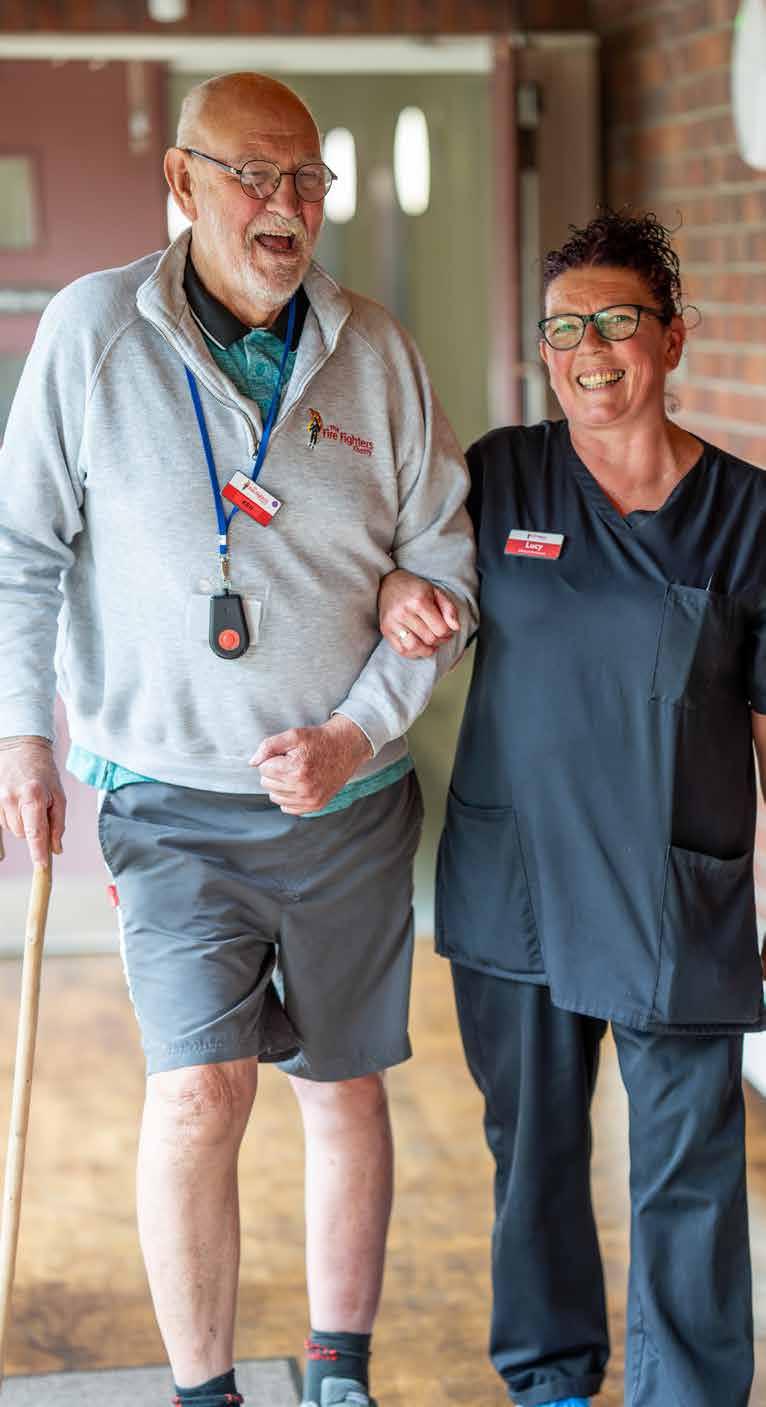
“I wouldn’t be where I am today without the nursing team. After spending 30 years in the fire service, helping other people and saving other people’s lives, it’s great to know that I can rely on someone else to help me now.”
Ken Brown, retired firefighter, Cheshire FRS
Read Ken’s full story.
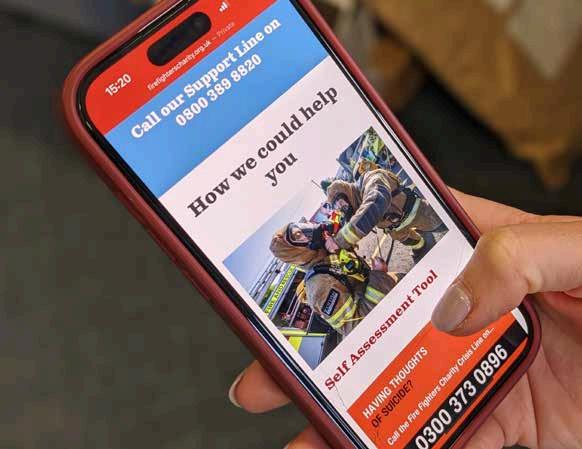
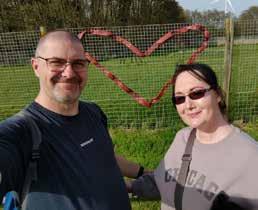
Self-guided solutions
Support should never be out of reach. That’s why we’re growing our suite of digital wellbeing tools, helping individuals take charge of their health anytime, anywhere. Whether it’s a self-assessment, online course or bitesize resource, our digital hub puts powerful support into the hands of our fire family. A highlight from this year was the launch of our new online mental health assessment tool to help people find the right support for them.
Self-assessment tool launch
Now available through our website, our new mental health self-assessment tool uses questions from validated psychological health assessment tools to help direct service users to the right type of support based on their needs.
• Launched in 2024/25, the new tool was used by 1,164 individuals over the course of the year.
• 27% of those who used the tool reported they were experiencing moderate to severe depressive symptoms.
• The tool directs people to early intervention support that’s right for them, such as our HOPE Programme and online courses in our Wellbeing Hub.
Online courses and bitesize resources
Available through our website, our broad range of online courses offers people support with issues such as anxiety, sleep, alcohol, menopause and gambling.
• Our online courses and bitesize resources were accessed 895 times in 2024/25.
• Our in-depth ‘Find Out More’ courses were accessed 401 times, with the majority of people using them to focus on anxiety and low mood topics.
• Our quick bitesize resources were accessed 317 times.
• Our full, multi-week courses were accessed 177 times over the course of the year.
HOPE Programme
Our online HOPE (Help Overcome Problems Effectively) Programme continued to be popular with service users across the UK in 2024/25, providing people with a virtual boost to their wellbeing during times of change or uncertainty, as well as those starting to struggle with their mental health.
• 664 people took part in a HOPE Programme online course in 2024/25, with 106 of them participating in courses focused on retirement.
• 74.5% of those who took part were serving personnel and 10.3% were former serving personnel.
• Our outcome data showed positive impact on completion of the programme.

A word
from: Mark Westgate, a firefighter with Norfolk FRS
Mark went through a challenging time after losing his mum to cancer and three colleagues to suicide. He shared how our HOPE Programme helped him move forward: “Everyone was absolutely amazing, nothing was too much and their manner was always friendly and helpful. In fact, it wasn’t until I spoke to the charity and started the HOPE Programme that I really realised the impact everything had had on me.”

Meet the Team: Joss Gaynor, Director of Impact & Service Partnerships
“Our growing range of digital health and wellbeing tools is about more than just providing support- it’s about giving people the tools, information, and confidence to take control of their wellbeing in a way that works for them.
Whether it’s through our self-assessment tool, online courses, or the self-directed HOPE Programme, we’re helping people access the right support at the right time, wherever they are, and in a way that fits into their lives. It’s about removing barriers and putting the power to improve wellbeing directly into people’s hands.”
Devon and Somerset Chief Fire Officer, Gavin Ellis
We’re delighted to be working closely with Devon and Somerset Fire and Rescue Service, to promote more targeted use of our services – for example, through the delivery of focused wellness coaching sessions – as well as increased fundraising activity.
Speaking about this valuable relationship, Chief Fire Officer Gavin Ellis told us: “As a Fire and Rescue Service, we’ve always had a close affiliation with Fire Fighters Charity. Our new, more strategic approach to working together reflects a shared commitment to supporting the health and wellbeing of our fire services community. We’re proud to deepen this relationship and help ensure our people can access timely, tailored support when they need it most.”

Meet the Team: Craig Williamson, Wellness and Behaviour Change
Coach:
“Even as a small team, we are reaching Fire and Rescue Service staff right across the UK - no matter how remote - ensuring they still receive the help they need. For me personally, it means a lot to be able to support personnel directly to improve wellbeing, right there in their workplaces - especially when Fire and Rescue Services do so much fundraising for us.”
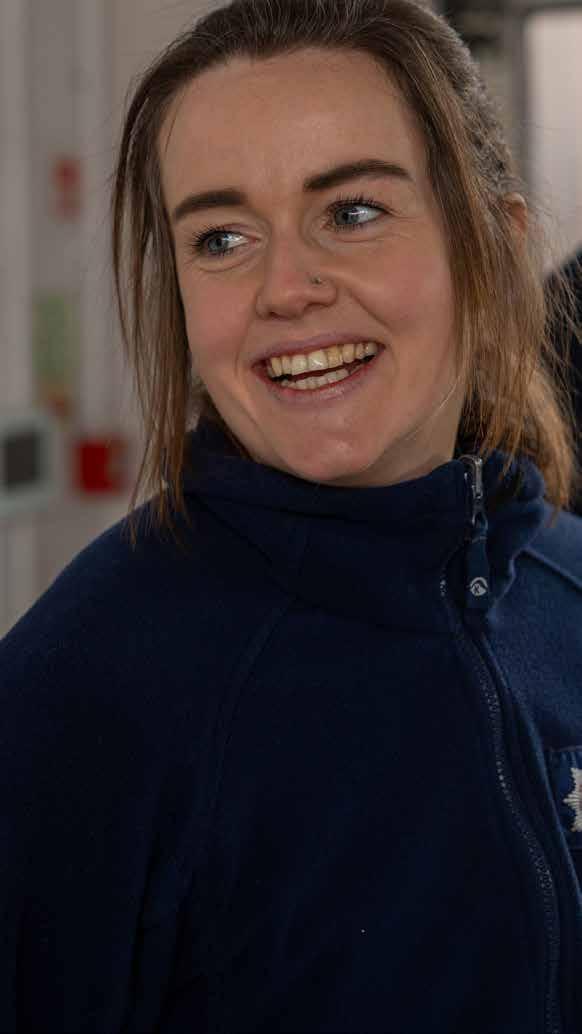
Collaborating on workplace wellness
We are continuing to work closely with fire and rescue services to understand the specific needs of their teams, before tailoring our health and wellbeing workshops accordingly.
We know that stress and trauma can sadly be realities of working in the fire service, but tackling these issues early – while building resilience through preventative advice and information –is key.
Our Wellness and Behaviour Change team have continued to build strong, structured and effective working relationships with Fire and Rescue Services across the UK, in order to improve awareness and access to services, increase fundraising opportunities and get closer to our service users.
Wellness workshops
We’ve seen an increase in the number of Fire and Rescue Service
Feedback from attendees:
personnel accessing wellness coaching workshops (up 25% from 23/24).
• 334 Wellness workshops were delivered across the UK. This includes 305 delivered directly to 33 different Fire and Rescue Services, as well as 29 open access workshops.
• 1,235 individuals attended at least one Wellness Coaching session, with total numbers of sessions attended reaching 3,048.
• 96% of attendees told us they were ‘highly confident’ or ‘somewhat confident’ to practice what they had learned after attending a Wellness Coaching session.
• “Interesting and assuring information shared with a good overall view of what menopause is, what it looks and feels like and what can you do about it.”
• “I have recommended this training to my colleagues who are/will be approaching retirement in the not too distant future.”
• “This was such a great workshop, thank you so much for your time and for bringing it to the Service. These certainly are the skills that every firefighter should have so they can look after their mind and stay as well as they possibly can.”
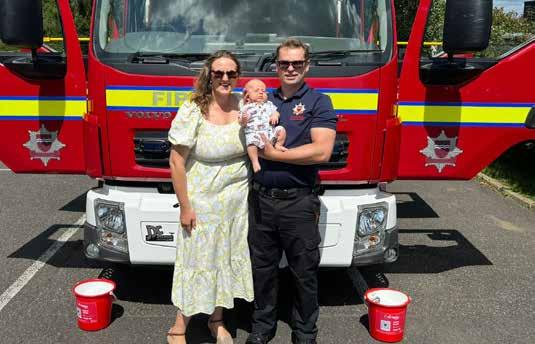
Welfare in action
When life throws up unexpected challenges – financial hardship, illness, or long-term conditions – no one should feel they have to face them alone. Our Welfare team steps in with practical support and compassion, helping people weather tough times, offering tailored support to ease financial strain and meet urgent, everyday needs.
This year, our Welfare team has been a vital lifeline for 451 individuals and families, providing compassionate, practical support during some of their most challenging moments.
The cost-of-living crisis has continued to weigh heavily on our fire family. In 2024, we saw a sharp rise in people reaching out for help with everyday essentialsparticularly around energy bills and food costs. According to the Office for National Statistics, 45% of adults in the UK reported an increase in their cost of living in July 2024, with more than one in 10 households struggling to pay for energy or to heat their homes.
In the last year alone, 130 people approached us with financial concerns. Our welfare caseworkers stepped in with tailored support to help ease the pressure.
This included:
• Provision of food vouchers
• Financial support to pay utility costs
• Travel expenses
• Clothing requests
• Accommodation requests
• Debt support

A word from: Jon Arey, Crew Manager with West Yorkshire FRS
Jon received support and guidance from us when he moved house with his daughter and faced financial challenges.
He said: “Your support was life-saving – I literally didn’t have food to put on the table.”
Prioritising prevention
This year saw a significant increase in the number of people accessing our information and advice online, empowering them to feel more informed, confident and in control. We’ve also worked hard to ensure we connect people with the right support sooner, giving more people access to effective self-directed support to improve their health and wellbeing.

• Advice and signposting to other organisations offering financial help
• Welfare benefits advice to help maximise income
But financial hardship isn’t the only challenge people face. We have also seen an increase in the number of people living with long-term health conditions, which has seen our team helping with more vital property adaptations and mobility support, enabling people to stay safe and independent in their homes. This included:
• Bathroom adaptations
• External ramps to properties
• Wheelchairs
• Mobility scooters
• Rise and recline chairs
• Financial support with lifeline costs
Behind each of these requests is a real story - of someone doing their best to carry on, often after years of dedicated service. Thanks to the generosity of our supporters and the skill of our Welfare team, we’ve been able to stand alongside them and offer a helping hand when it’s needed most.

Meet the Team: Carrie Pearce, Welfare Services Lead:
“Over the last year, we’ve seen a massive increase in the number of people living with long-term health conditions – many of which sadly have no cure. In response to this, we’ve increased our support through regular keep-in-touch calls and by guiding individuals towards statutory services and welfare benefits.
“This growing need reinforces just how vital early, preventative support is. The information and advice our charity provides can make all the difference in helping people understand the importance of early recognition and timely intervention.”
Website information and advice
With a diverse range of articles, online toolkits, resources and courses, our website – www.firefighterscharity.org. uk – remains a vital and trusted source of health and wellbeing information for the fire services community.
• Our website had over 221K visits in 2024/25, with 21.5K of those accessing pages providing trusted health and wellbeing advice.
Helping people get the support they need
To ensure we are helping people get the support they need we handle every enquiry that comes in to us through our website or Support Line with the utmost care, ensuring that each call is handled sensitively and that every individual is given access to the right help, information and advice for their needs.
In 2024/ 25 we responded to 9,516 web enquiries, emails and calls from people reaching out to us for help.
1,269 people received direct advice from us on how to navigate support for their health and wellbeing.
A word from: Matthew Handley, a firefighter with Merseyside Fire and Rescue Service:
“My fiancée was pregnant with our second baby when I called the charity. She had hyperemesis gravidarum (extreme morning sickness) and, having had it the first time, we were aware how bad it could be. For us, it was more the mental side really, knowing we could have eight more months of that severe sickness.
“The charity was so great, they sent me an email straight away with loads of options of where we could access support and signposting us to organisations which specialised in hyperemesis gravidarum. Knowing it’s there in the future is so nice.”

Meet the Team:
Emma Smith, Assessment Practitioner Team Manager
“This year, our team has strengthened engagement with our service usersespecially around information, advice, and signposting.
“By embedding online resources and signposting into many of our support plans, we’re helping people stay well and manage challenges more effectively. We’ve had more contact, better understanding of the support we offer, and a lot of really positive feedback.”
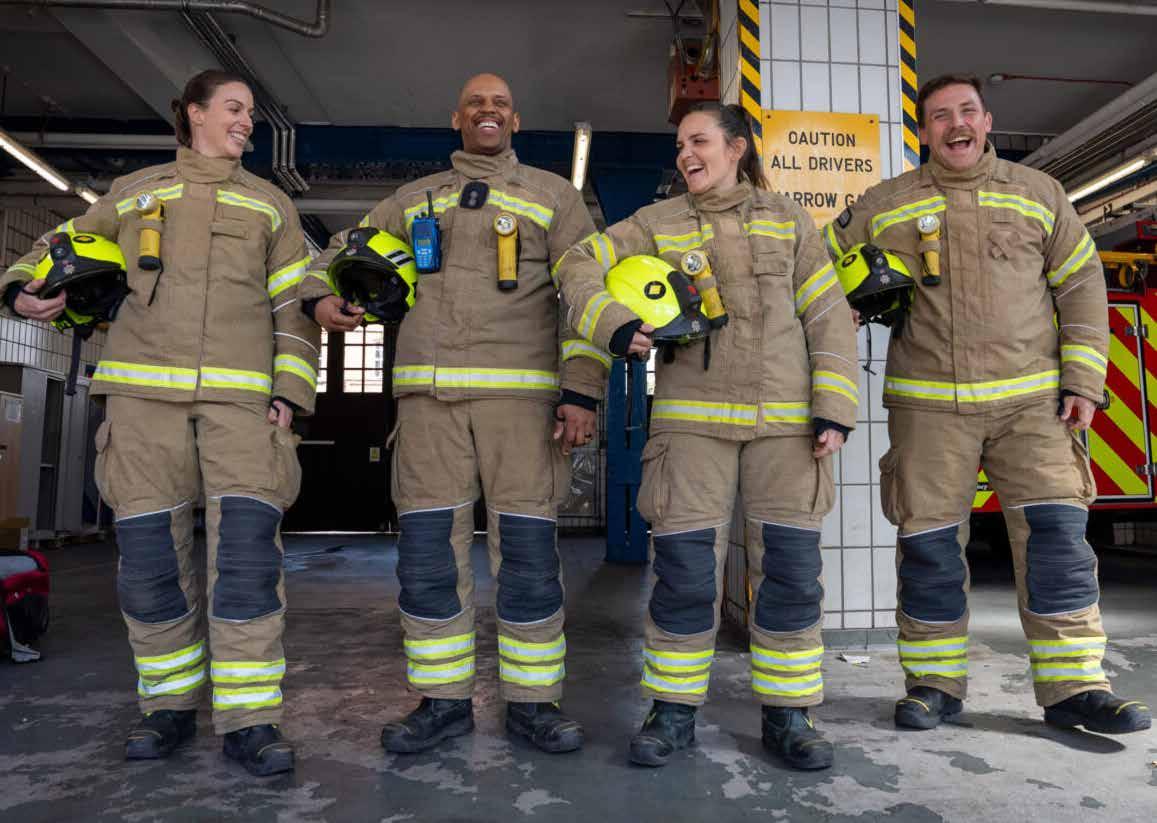
Driving innovation and impact
The importance of our research
The demands of fire service life are unique, and so are its pressures.
Understanding the real impact of service starts with listening. Our research is grounded in the lives of the people we support – helping us build services that respond to their reality, advocate for their needs, and shine a light on the challenges they face. We’ve invested in some key research projects to boost public awareness and understanding, and because those we support deserve to feel valued and recognised.
Through our research we want to ensure that the support, resources, and practices available across the sector reflect a true understanding of those realities.
We’re committed to asking better questions and listening more closely to build a clearer picture of what will really make a difference to the wellbeing of those working in fire.
We are focused on applied, collaborative research that improves practice, informs better support systems, and leads to meaningful, lasting change. Our role is to connect evidence with everyday practice.
Collaboration at the core
Everything we do in research is collaborative. We partner with services, practitioners, academic experts, and lived experience voices to make sure what we’re learning reflects the complexity of the real world and is designed with practical application in mind. Together, we can create knowledge that leads directly to better tools, better support, and better outcomes.
Service User Experience Panel
We launched our Service User Experience Panel in April 2024, continuing to recruit members throughout the year. At the time of writing, the Panel now includes 140 members from across the fire services community.
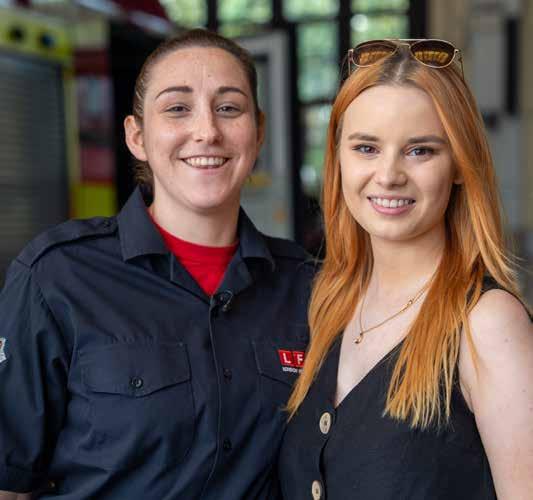
Spotlight: Thriving Relationships project
Over this year, the panel has provided invaluable insight into the experiences, needs and preferences of those we support, helping us shape services that are truly responsive to need.
Their perspectives have informed decisions and shaped work such as the development of our self-assessment tool, service user communication from our intake and assessment services, regular giving initiatives and the early stage of the development of our service user participation strategy.
We are committed to building on this foundation, deepening our efforts to embed service user voice across everything we do. In the year ahead, we will continue to develop opportunities for meaningful participation, making sure that those we serve have a real say in the design and delivery of support.
This year we initiated a project, in collaboration with Nottingham Trent University, Relate at Family Action and Norfolk Fire and Rescue Service, to better understand how fire service life affects partner relationships. This research seeks to explore what helps members of the fire family build and sustain strong, healthy relationships and then to develop resources and tools to help their relationships thrive.
As the first stage, we launched a survey in March 2025, which received over 500 responses. The next stage will see a series of online focus groups take place, gathering further insight, before relevant tools and resources are developed in the coming year.
Ceri Sumner, Chief Fire Officer of Norfolk FRS, said of the partnership: “Norfolk Fire and Rescue Service are pleased to have established a partnership with experts in the field, Fire Fighters Charity and Relate, to develop and pilot the Thriving Relationships programme. It is our hope that the work started at our stations locally will have a significant impact on fire families nationally.”
Carol Florin-White Relate, National Partnerships Director at Relate at Family Action, said: “We were thrilled to be approached by Fire Fighters Charity and Norfolk Fire and Rescue Service to provide support to front line and support staff and families. This is such an exciting opportunity to reach a new audience and to support firefighting personnel who put their own lives at risk to save others.”
Looking Ahead
As we look to the future, our research agenda will continue to be guided by one question: What will make the biggest difference in practice?
We’ll keep listening, learning, and working together—because we know that when research is grounded in real lives and real needs, it can do more than inform. It can transform.
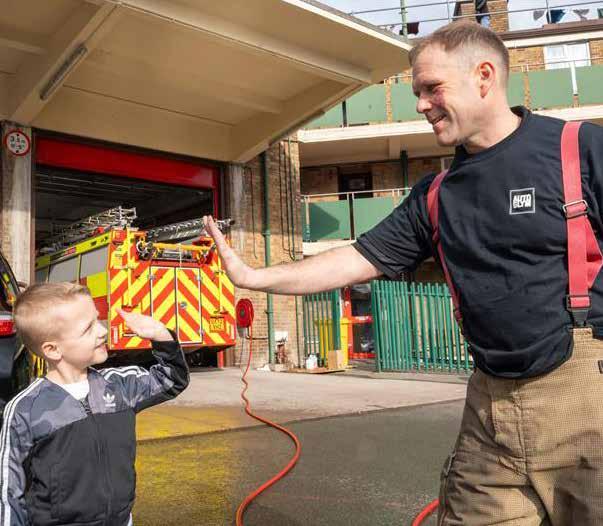
Funded by our supporters
Every act of generosity fuels our mission. From lottery players to legacy givers, our supporters are the driving force behind our care. Every pound we raise is thanks to the generosity, passion and dedication of the people who believe in our cause. In 2024/25, our supporters came together to raise millions of pounds, helping us continue delivering life-changing care to thousands in our fire services community.
Donors and donations
Our regular donors are the lifeblood of our organisation, providing us with vital sustainable income that allows us to plan ahead and keep our services operating year-round. And this year – together with generous one-off donations from 4,833 people – they raised over £4.1million.
• £2,300,287 was gifted to us by over 25,000 donors
• £358,467 was raised from nearly 7,000 one-off donations, including 773 gifts made in memory of a loved one, totalling more than £126,000
• Over 20,000 players of Fire Fighters Lottery raised an incredible £1,465,402
• Our Lottery Superdraw raised more than £48,000 from over 2,700 players
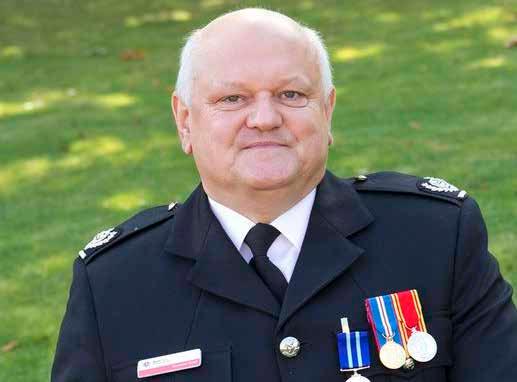
A legacy to remember
Graham Gash was a firefighter right to his core.
After beginning his career as a junior firefighter in Dover in 1974, he served 43 years with absolute dedication. Shaped early on by the Crypt restaurant fire there, he became known for his commitment to preparedness, leading exercises and training that kept colleagues at the highest standard.
His fingerprints are still present on many of the emergency response plans at Kent FRS and procedures they have developed. He was a true professional with an absolute dedication to duty. And it’s that passion for the fire service that led him to leave a legacy to us when he died.
Graham’s generosity has enabled the refurbishment of a Wing at Jubilee House in his memory, alongside other vital improvements around the charity.
The Wing offers a welcoming place to stay while individuals receive clinical care, wellbeing support and practical help – empowering them to manage the impact of service and adapt to injury, illness, or emotional strain.
Lasting legacies
Gifts in wills are a powerful way to support future generations of the fire family. In 2024/25, 44 people left a lasting legacy to our charity:
• £1.8million was generously left to us through legacies
• 33 more people pledged to remember us in their will
His brother, Steve, told us: “I think it’s so important to people at the sharp end, who served just like my brother, risking their lives for their communities… Once you have a family member in the fire service, you also become part of the fire family. I know he’d be proud.”
The people behind the numbers
These incredible totals are made possible by the collective effort of thousands of individuals. In 2024/25, our fundraising family included:
• 26,209 regular donors
• 4,833 one-off donors
• 20,376 lottery players
• 610 Fire Family Fundraisers
• 635 teams of car washing volunteers
• 100 challenge event participants Thank you…everyone!
Holidays with a difference
Our holiday rentals bring much more than sunshine and fresh air. Every booking helps fund our charitable work –and in 2024/25, more than 3,000 guests chose to stay at Harcombe House, Marine Court or Jubilee House.
• Our centres generated £364,000 in rental income, delivering £118,000 profit
• 486 breaks were booked at Harcombe House, an increase of 13% from 2023/24, 317 at Jubilee House (a 60% increase on the year before) and 234 at Marine Court (a 26% increase on 2023/24)
• We introduced availability of short weekend breaks
• Our in-house chefs prepared an impressive 33,640 meals for guests
Shop sales boosts support
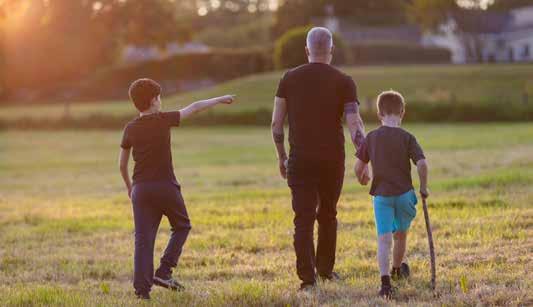
Recycling challenges
From t-shirts to children’s toys, to ceremonial retirement gifts, our online shop continues to be a popular way for supporters to show their pride – and give back.
• £216,000 in sales raised £21,000 profit for the charity
• 3,282 orders were placed – a 2% increase on the previous year
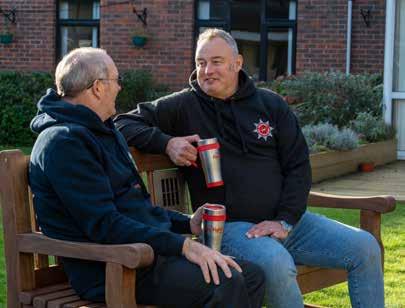
Powering Support
We work hard to generate income for our charitable services from the assets we are lucky to have in service of our charitable purpose. Hiring out our facilities to businesses for meetings and conferences, contracting rehabilitation programme delivery to other organisations, and even having local swim schools operate from our pools when they are not being used for our health and wellbeing provision, means we can maximise the funds we need to deliver our charitable services.
Rehabilitation programme sales
• 29 external clients accessed our residential, outpatient or recuperation programmes
The textile recycling market faced headwinds in 2024/25 due to global instability, cutting the price per tonne of clothing almost in half. But thanks to the incredible efforts of fire stations across the UK, we still raised a significant total:
• £644,000 income from 1,153 clothing banks – a £313,000 drop from the previous year
• Despite this, 5,078 tonnes of clothing were collected – 352 tonnes more than in 2023/24
• The efforts of our communities to recycle with us resulted in £589,000 being made availale for our charitable services
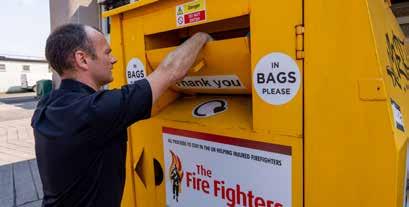
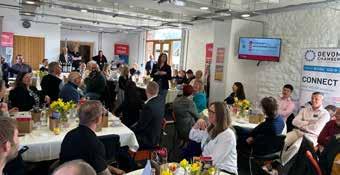
• This generated £67,000, returning £42,000 profit
• We continued developing our offer for future clients Centre facility hire
• Meeting rooms, pools and gyms at our centres were hired out when not in use by our services
• This raised £117,000, with £85,000 profit reinvested into the charity
The impact of this generosity
We don’t receive direct Government funding. That means every one of the 10,267 people we supported this year was helped thanks to the people who donate, volunteer, or take on a challenge for us.
You make our work possible – and you change lives.
Thank you.
Fundraising, fundraisers and events
Across the length and breadth of the UK, our incredible supporters outdid themselves in 2024/25! They climbed mountains, ran marathons, broke world records and did everything from washing cars to baking cakes in support of Fire Fighters Charity. Together, they raised more than £2.1M through over 1,800 fundraising challenges or events. Here are a few of the highlights...
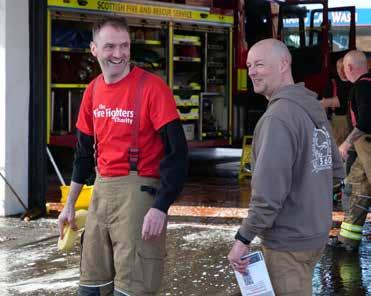
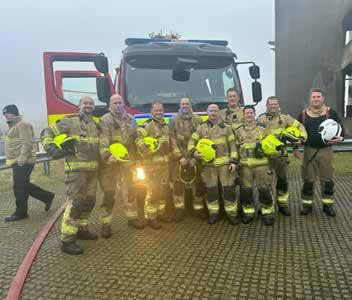
A 12-strong group from West Yorkshire’s Killingbeck Fire Station took on the Great North Run in 2024 in full fire kit, raising more than £8,800
Gavin Healeas was one of the firefighters who took part and said: “It was great to take part with all of my colleagues. Being a firefighter, it’s a charity that’s there for us, it’s a major reassurance having it there.”
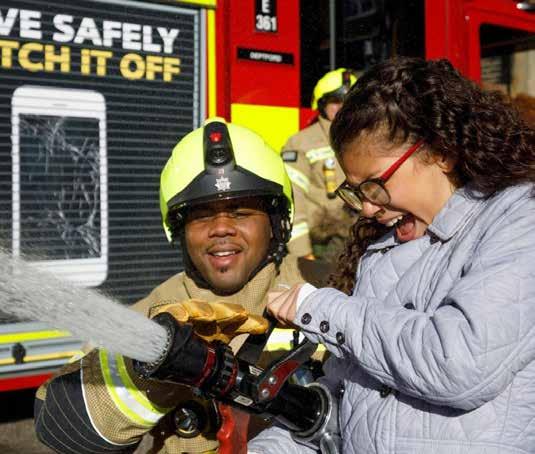
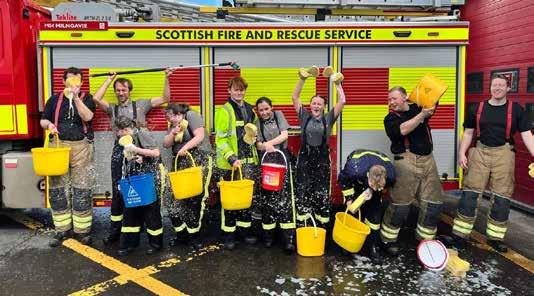
Buckets at the ready
An incredible 635 car washes were held in 2024/25 by Fire and Rescue Services, raising more than £466K. As ever, our car washes were supported by our friends at Autoglym, who kindly donated car shampoo at every event for the sponge-wielding firefighters.
Presteigne Fire Station in rural Mid and West Wales raised thousands for us in 2024 through a number of fundraising events, including car washes, a raffle, open days and more – a shining example of the impact local communities can have.
Dougie Preece, one of the on-call firefighters based at the station, said: “We don’t go many years without doing something. It means a lot to all of us to support the Fire Fighters Charity. We’ve had various crew members who’ve had support, so we know the difference these funds make.”
Fire Family Fundraiser fun
Last year 610 people held a Fire Family Fundraiser for us, together raising more than £687K. They took on an incredible array of inspirational events, from cake sales to physical challenges.

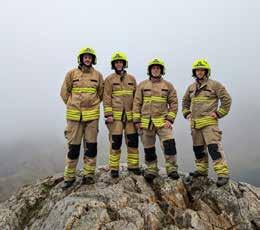
Rising to the challenge


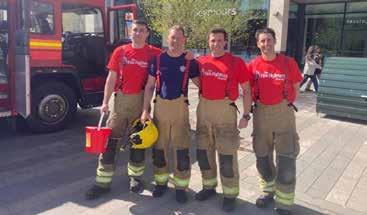
Our incredible 2024 London Marathon runners raised more than £60,000 for us, with all those taking part in other major running, cycling and endurance events across the year bringing our central events total for the year to more than £115K.
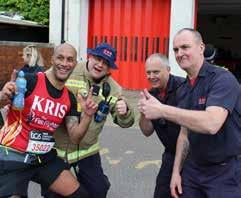








“I ran the London Marathon in full fire kit and a BA set for Fire Fighters Charity as I’ve had close friends affected by traumatic incidents and know the importance of the charity’s support. I’ve previously been knocked mentally after attending traumatic incidents, and knowing there is support from the charity - should we need it - puts my mind at ease.”
Miles Drobny, London Marathon 2024
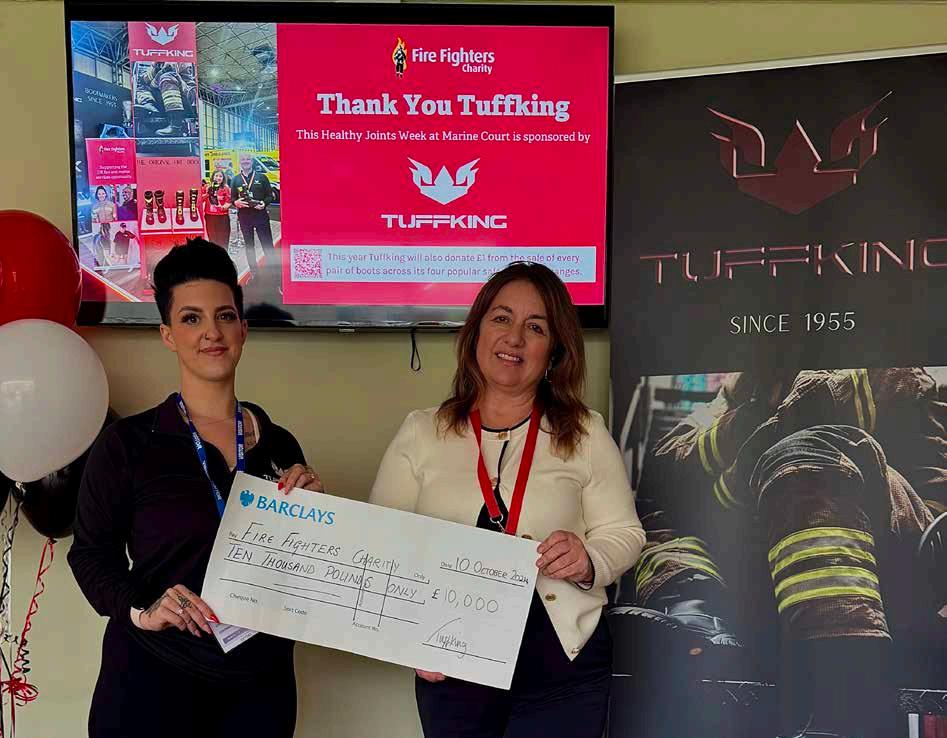
Funded by our partners
Yet again, we’ve had some incredibly generous support from corporate supporters, trusts, and foundations over the past year through donations, partnerships and events.
We’re proud to celebrate the growth of our network of partnerships - including new and existing corporate supporters and generous grants - and the transformational impact their support continues to have on our service offering.

Thanks to the Wolfson Foundation
One particular highlight of the year was the generous £60,000 grant from the Wolfson Foundation, which enabled us to refurbish two nursing rooms at Jubilee House. Thanks to this investment, we transformed the space into a purpose-built facility designed entirely around the needs of those we support - enabling greater independence and helping individuals to achieve their health and wellbeing goals.
Paul Ramsbottom, Chief Executive of the Wolfson Foundation, said: “We were pleased to support Fire Fighters Charity in their work to improve the nursing rooms at Jubilee House in Cumbria. The care delivered there provides vital, personcentred support to members of the fire services community. These improvements ensure the facilities match the quality and compassion of the care itself.”

Welcome Tuffking
We were also thrilled to welcome Tuffking as a new corporate partner in 2024. The firefighting footwear provider pledged to donate £1 from the sale of every pair of boots across four of its most popular ranges and sponsored a Healthy Joints Week at Marine Court - demonstrating their strong commitment to firefighter wellbeing.
Julian Bartholet, Tuffking’s UK and European Sales Director, said: “We’re delighted to be working directly with Fire Fighters Charity on this valuable partnership. We’re passionate about championing the charity’s work with Fire and Rescue Service personnel and look forward to raising funds and, crucially, awareness of its health and wellbeing support.”
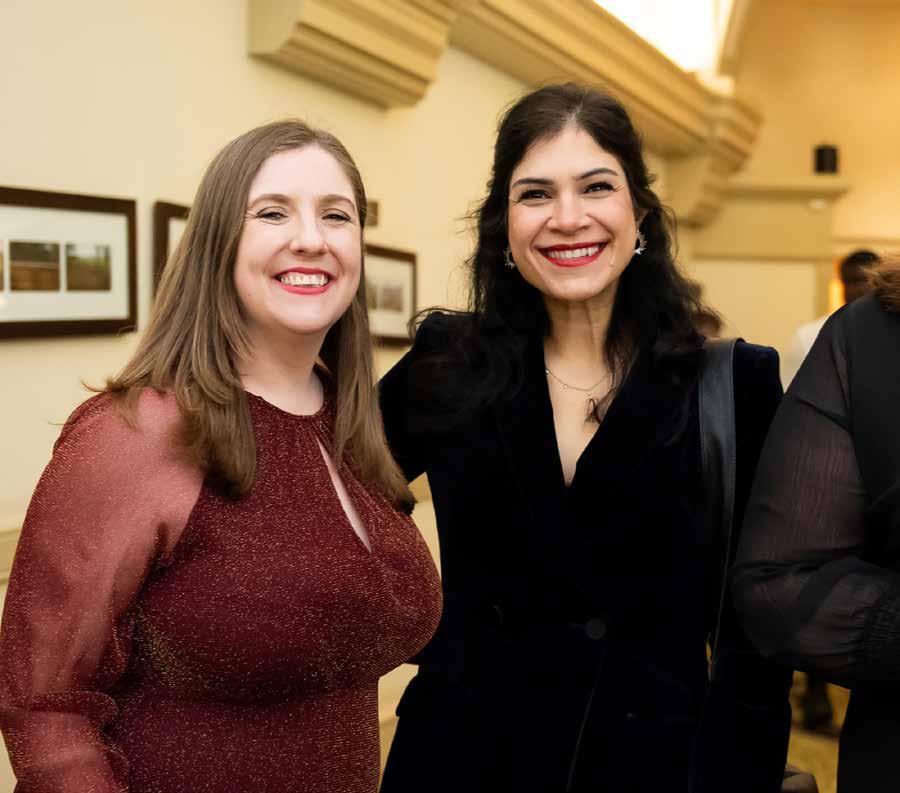
The main events
We were once again honoured to be chosen as the benefitting charity for a number of key events across the fire industry - raising over £35,000 – across the year. These included:
• Inclusive Companies, Inclusive Awards Event
• BT Tower Event
• Western Business Media, Fire Safety Matters Awards event
• Fire Magazine, Excellence in Fire Awards
With thanks: Trusts and foundations
Thank you to the many trusts and foundations who generously donated to us over the past year, including:
• Wolfson Foundation
• Wimbledon Foundation
• The Zochonis Charitable Trust
• The National Lottery Community Fund
• The Orr Mackintosh Foundation
• The Geoff and Fiona Squires Foundation
• CSIS Charity Fund
• The Grace Trust
• Edith Murphy Foundation
With thanks: Corporate supporters
Our thanks as ever to the many companies and organisations who donated to or supported us in 2024/25, all in unique ways – from sponsorships through to Charity of the Year partnerships, sale of products, fundraising and more. Here are a few of them:
• Autoglym
• Elvis & Kresse
• Tuffking
• Western Business Media
• Oddballs
To join their ranks and make a difference to our fire family, get in touch for a chat. Our Corporate Partnerships Manager, Debbie Rushbrooke, can be reached on drushbrooke@firefighterscharity.org.uk
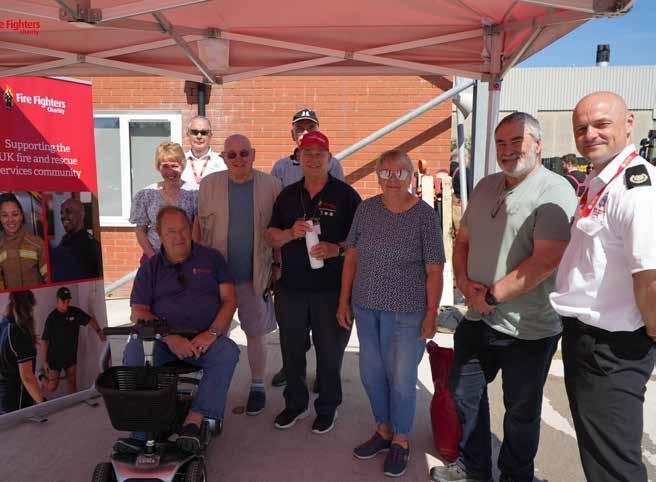
Powered by people
Behind every service we offer is a network of people giving their time, skill and heart. Our volunteers aren’t just helping hands – they’re lifelines, helping us reach more people, connect more deeply, and do more towards our charity’s mission. From centres to community groups, their dedication powers so much of what we do.
Because every pound raised, and every hour volunteered, powers real care that helps the fire family stay strong, connected, and well.
We now have an incredible 1,438 volunteers offering their time to support us
– with 1,153 of those providing key links in their local communities and helping us stay connected to Fire and Rescue Services across the UK as Station Reps.
• 90 new Station Reps recruited over the year
• 58 - the total number of volunteers supporting the delivery of our services
– including Telephone Befrienders, Living Well Group Co-ordinators and HOPE Programme Facilitators – an increase of 16 over the course of the year
• 9 new centre-based volunteers recruited, including vital Visitor Service Volunteers.

A word from:
Mike Harris, a retired firefighter
Mike, who’s been volunteering as part of our Visitor Services team at Jubilee House, said: “I knew I needed to do something after retiring, I didn’t just want to sit at home. got in touch with the charity after seeing a post about volunteering opportunities online.
“The role is very varied but I think it’s particularly valuable to be on hand when people arrive, especially people who are visiting for the first time, as they won’t know where to be and may feel apprehensive. I thoroughly enjoy it - it’s beneficial to the charity, but it’s certainly beneficial to me as well.”
Many of our volunteers bring with them a wealth of lived experience from careers in the fire service, offering invaluable insight and a shared camaraderie in their roles. Others, while not from a fire service background, are driven by a desire to make a real and lasting difference.
From welcoming visitors at our centres, supporting people in our Living Well Groups out in the community, to volunteering directly with Fire and Rescue Services and taking part in events, fundraising, and awareness campaignsthey play vital roles across every part of our work.
Every volunteer, no matter their background or role, is directly helping us to offer better support, and continue being there for those who need us most.

Meet the Team:
Rebecca Webster, Organisational Development & People Partner:
“Our teams really appreciate support from volunteers and I love getting feedback from them, it’s really special. Lots of them talk about the connections they’ve made and the enjoyment they’ve found through the roles.
“We’ve got a range of volunteering opportunities available now, whether it’s at our centres or across the UK. Some include Visitor Services, gardening, telephone befriending, estates and facilities, plus lots more.”
“I’m passionate about supporting the charity because I’ve seen the incredible difference it makes. My partner has received psychological support and found it so helpful, and many of my colleagues have too - they only have positive things to say. I truly believe in the connection between mind and body, and the charity’s support is always all-encompassing.”
Hannah
Poole, Crew Manager, Company Member, Service Co-ordinator and Station Rep, Kent FRS
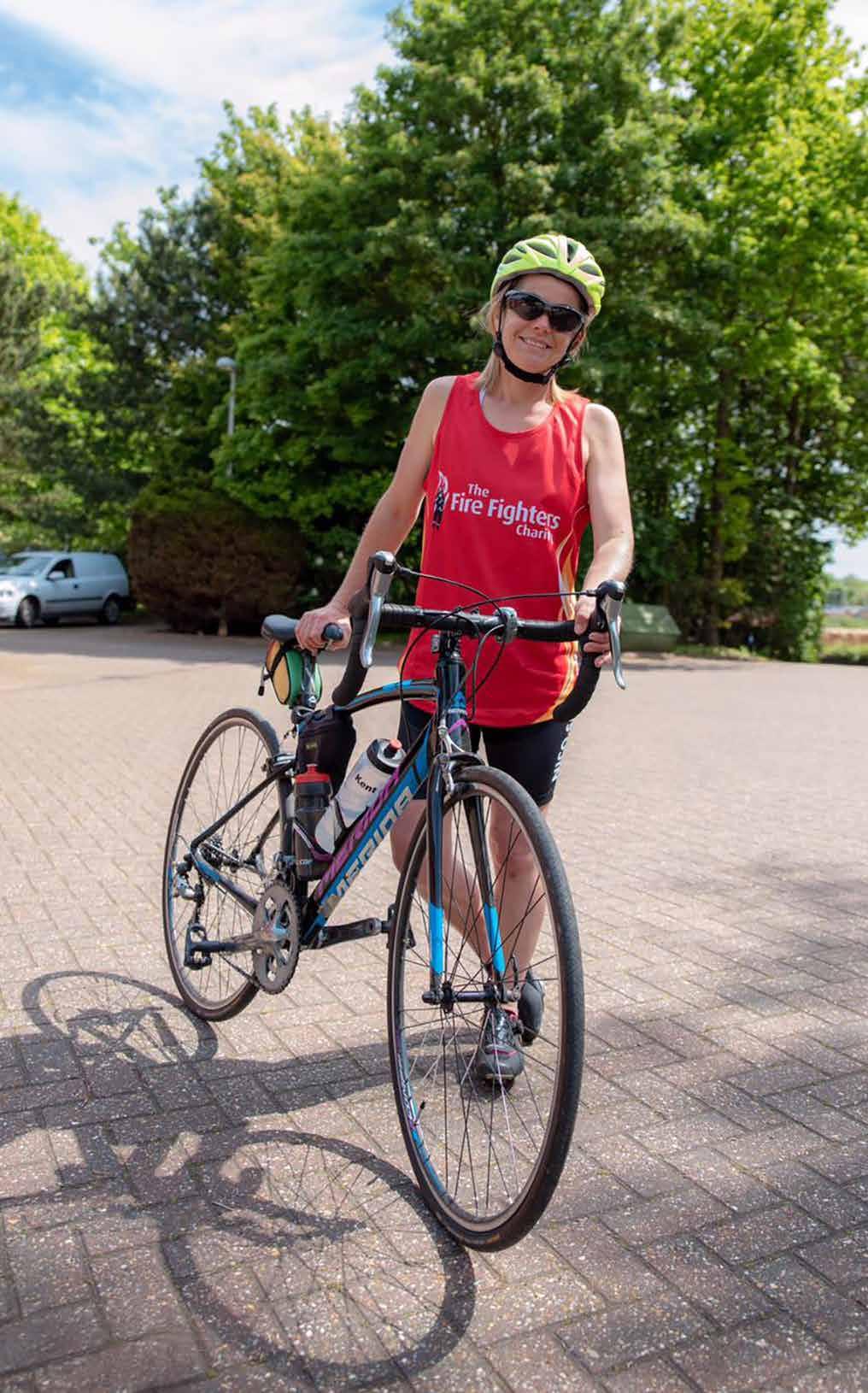
“I love spending time with all the families visiting Harcombe House on our Families Weeks, you can see how much the break away means to them - especially those going through challenging times. We’re making a real difference to their lives.”
Jason Stone, Welfare Caseworker

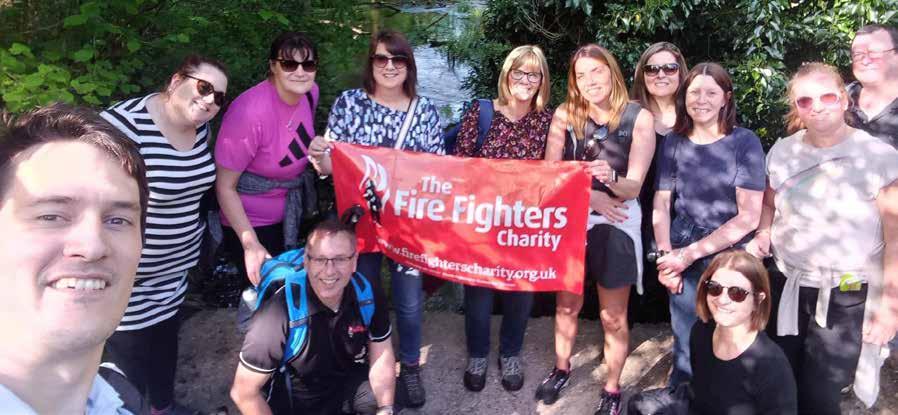
The heart behind the mission
Working for our charity is much more than a job for our staff, it’s a passion to make a difference – and we are proud to celebrate their years of dedication to our cause.
Our team
We are proud to now have 210 employees, each one living our core values in their roles – especially inclusion. For many, this isn’t just a workplace, it’s a community where they feel supported, valued and empowered. Some staff have been with us for over 30 years – a testament to the culture we’ve built together. You can hear from two of them below.
Marking Mental Health Awareness Week
We came together to mark 2024’s theme: ‘Movement’ and encouraged all our employees to look after their mental wellbeing and build resilience by taking 30 minutes out of one of their working days to do something they enjoy, from walks in the countryside to activities indoors, at our centres, or at home.
Our employees at Harcombe House, teamed up to cycle, walk, run or get
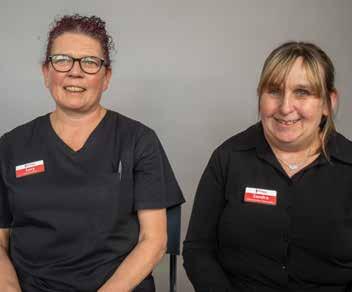
Sandra Harrison started in 1995 as Head Housekeeper and moved into the administration team in 2004. She recently celebrated her 30-year work anniversary in the position of Admin Team Leader at Jubilee House, before being appointed Centre Operations Manager. She shares:
“We are like a family here, we all look out for each other. My message to any employees just starting out with the charity would be, ‘it’s such a fantastic place to work. And just remember who
active in their own way throughout the week - as a team, they travelled 50.84 miles (the equivalent of Harcombe to Tintagel). The team at Marine Court, meanwhile, spent five minutes every morning doing a Tai Chi routine.
Living our values
Our values aren’t just words – they’re reflected in real stories. A few of our colleagues have shared their experiences of feeling included and respected at work, which you can read at www. firefighterscharity.org.uk/inclusion. You can also hear directly from our people in a short video, sharing what inspires them every day: www.firefighterscharity. org.uk/meet-our-people.

you’re looking out for, who you’re doing it for. That’s why we’re here’.”
Lucy Milton, Clinical Assistant at Jubilee House, works alongside the nursing team. She started as a housekeeper originally and is also celebrating 30 years working for us. She shares:
“I wouldn’t want to do care anywhere else now. We spend quality time with our clients which is lovely, you get to know them. We make a huge difference to people’s quality of life.”
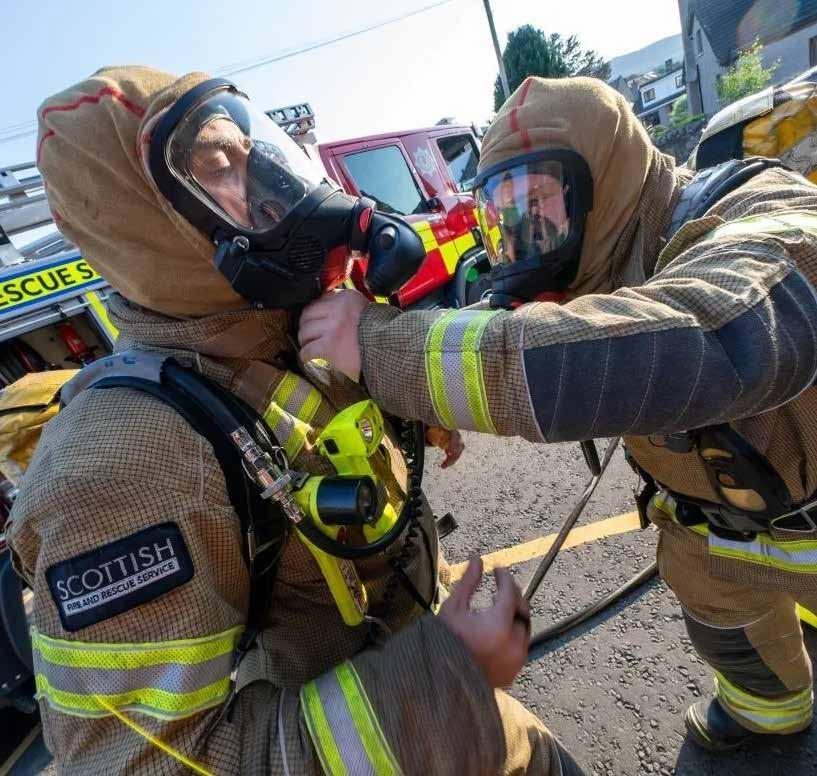
Trustees’ Report and Financial Statements
The trustees are pleased to submit their Annual Report and audited financial statements for the year ended 31 March 2025.
The trustees are also the registered directors of the charitable company.
Structure and Governance
Legal and Administrative Information
Legal and administrative contact information is given on page 71 .
Legal Status
Fire Fighters Charity is a company limited by guarantee and a registered charity, incorporated in England. The guarantee requires each member to contribute an amount not exceeding £1 in the event of the charity being wound up. The charity is governed by its Articles of Association dated 21 November 2024.
Charitable Aims, Public Benefit and Provision of Services
The trustees have carefully considered the Aims of the charity and how it measures up to the Public Benefit test. The charity provides a range of services to the fire services community and the trustees are satisfied that there are identifiable benefits that meet the Public Benefit Summary Guidance from the Charity Commission.
Fire Fighters Charity is a national charity providing assistance to serving and retired members of the fire and rescue services community, including eligible dependants. The charity works to improve the health and wellbeing of its service users, so they can have access to the timely health care and wellbeing support they need, during and after service.
The charity supports its service users through online, telephone, community-based and residential health care and wellbeing. Support is personalised to meet each service user’s unique physical, emotional and social wellbeing needs and is accessed through a confidential helpline on a self-referral basis.
Defined criteria are in place for all the charity’s health care and wellbeing support services to ensure there is equity in access to the provision of services and charitable funds are used in line with need. The charity’s services are articulated in an approved service delivery document and all service delivery is underpinned by a Clinical and Social Care Governance framework ensuring continuous improvement and high standards of care are maintained. Systems and processes underpin the wider clinical and social care governance framework to ensure quality in service provision. All services, and research activity are organised around a single definition of quality. This definition of quality is that the charity provides:
• Care and support that is effective, is safe and gives as positive an experience as possible by being caring, responsive and personalised.
• Our services are well-led, sustainable, and equitable, and achieved through working together and in partnership with our service users.
The support provided to service users by the charity is free of charge for identified need. This enables access to services for all prospective service users, irrespective of financial circumstances. Financial support to access the mainland for residential services can be provided to service users who reside on the UK islands.
Trustees receive data and research, against which the effectiveness of service provision can be measured (and to identify where future service development may be required). The charity commissions or undertakes research to understand the health and wellbeing needs of the fire community, and this evidence informs service delivery.
Online and telephone support
The charity provides digital support using a variety of apps and a secure remote consultation platform that allows confidential consultation and the provision of physiotherapy and exercise therapy in support of primarily physical problems. Alongside this the charity provides access to a wide variety of self-service web-based information and resources, webinars alongside direct online and telephone counselling for those service users needing mental health support. The charity also arranges quality assured face-to-face and online mental health support from external sources, providing easier access to support for service users in geographically and socially varied groups.
Residential services
The charity has three residential centres which offer a range of activities and programmes of support led by a multi-professional team which includes Chartered Physiotherapists, Exercise Therapists and Psychological Therapists. Residential support is available for service users recovering from injury or illness, for those encountering challenges with their mental health, and those who present with long term and degenerative conditions. Our centres also provide support for individuals, couples and families, who simply need the opportunity to take ‘time out’ and benefit from a period of rest. Facilities within each centre include a gymnasium / fitness room, leisure pool and hydrotherapy pool. Harcombe House also has specialist facilities for families and children. Residential stays are short term; service users spend an average of 4-7 days at a centre, however there is some flexibility in the length of a stay depending on individual need.
Residential support is underpinned by a philosophy of empowerment and recovery and is tailored to meet the needs of individuals, couples and families with the multi professional team working in partnership with service users to identify solutions to meet their mental health, physical health, and social wellbeing needs. Service users may engage in different levels of activity, ranging from a residential stay that focuses on rest and relaxation to participation in a programme of structured activity. Health and wellness coaching is embedded within the support provided at the centres, providing service users with up-to-date, evidence-based information to enable them to make informed choices around their wellbeing. Residential support may be ‘front-ended’ with online support which may also be in place to support sustained change following a residential stay.
Access to the most appropriate support is agreed in partnership with the service user following assessment of need and desired outcome. Admission criteria support decision making to ensure that access to support is equitable and inclusive, and the charity values are upheld. All support provided by the multi professional team is evidence based and adheres to best practice.
Nursing services are available at Jubilee House for service users with more complex needs who may require nursing or personal care. The charity’s nursing services are regulated by the Care Quality Commission and delivered by a team of Registered Nurses and Clinical Assistants. A Nursing Services Lead (Registered Manager) oversees the delivery of this service. Currently the nursing provision continues to be rated as Outstanding.
Fire Fighters Charity also offers structured family programmes at Harcombe House at specific times during the year. These programmes support the family unit to manage challenges they are facing in life and provide families with the opportunity to relax, enjoy quality family time and meet other families who experience similar challenges. A range of appropriate activities is also available as part of these programmes, seeking to encourage greater social interaction, communication, increased confidence and improve wellbeing.
Practical support
The charity recognises that some service users may require support at home or when accessing services in their local communities. A small team of Welfare Caseworkers offer confidential, impartial advice and information on a wide range of issues that affect and impact upon everyday life. The team carry out face-to-face and telephone assessments to identify solutions to meet individual need.
Needs are assessed within a structured framework and against financial criteria. Statutory entitlements are fully considered and match funding opportunities with other organisations explored. Solutions can include the provision of equipment, assistance with home adaptations, or financial solutions to relieve crisis such as food poverty. Solutions provided in this way are largely short-term; long term support is only provided in exceptional circumstances and is subject to annual review. The team also provide telephone advice, signposting to other providers, or support to access local community groups or health / social care services.
Community-based and peer-led support
The charity also runs ‘Living Well Groups’. These are community-based peer-led volunteer groups that focus on providing a longer term and sustainable way of keeping in touch and connected after service.
The charity also provides a telephone befriending service that involves fully trained volunteers engaging in regular ‘telephone chats’ with a matched service user with a view to reducing loneliness and social isolation.
Support provided directly to Fire and Rescue Services
Acknowledging the power of prevention and with the focus on improving the population health of our community, the charity also provides wellness and behaviour change coaching directly to members of the UK Fire and Rescue Services (UKFRS), through both digital and face-toface delivery, supporting members of the workforce in the provision of health information and behaviour change to support mental, physical, and social health and wellbeing.
Trustee recruitment, appointment and training
The charity recruits trustees nationally in line with its Articles of Association, role description, and person specification. Board-approved procedures govern recruitment, selection, and induction.
When appointing a trustee, the process includes:
• Reviewing the skills audit to identify Board gaps and define recruitment needs.
• Advertising the vacancy and issuing application documents.
• Shortlisting candidates against role requirements.
• Interviewing shortlisted candidates before a panel comprising the Chair or Deputy Chair, one trustee, and two Company Members.
Procedures are regularly reviewed to ensure transparency, consistency, legal compliance, and effective skills assessment. New trustees receive a structured induction, and ongoing training is based on Board and individual needs. Vacancies arising outside the annual cycle may be filled until the next AGM.
All trustees give their time voluntarily and receive no financial benefits from the charity. Any expenses reclaimed are in line with Board approved policies and are set out in note 6 to the accounts.
Statement of trustees’ responsibilities
The trustees (who are also directors of the Fire Fighters Charity for the purposes of company law) are responsible for preparing the Trustees’ Report and the financial statements in accordance with applicable law and United Kingdom Accounting Standards (United Kingdom Generally Accepted Accounting Practice).
Company law requires the trustees to prepare financial statements for each financial year, which give a true and fair view of the state of affairs of the charitable company and the group and of the incoming resources and application of resources, including the income and expenditure, of the charitable group for that period. In preparing these financial statements, the trustees are required to:
• select suitable accounting policies and then apply them consistently
• observe the methods and principles in the Charities Statement of Recommended Practice (SORP)
• make judgements and estimates that are reasonable and prudent
• state whether applicable UK Accounting Standards have been followed, subject to any material departures disclosed and explained in the financial statements
• prepare the financial statements on the going concern basis unless it is inappropriate to presume that the charitable company will continue in business.
The trustees are responsible for keeping proper accounting records that disclose with reasonable accuracy at any time the financial position of the charitable company and enable them to ensure that the financial statements comply with the Companies Act 2006 and the Charities and Trustee Investment (Scotland) Act 2005 and the Charities Accounts (Scotland) Regulations 2006 (as amended). They are also responsible for safeguarding the assets of the charitable company and the group and hence for taking reasonable steps for the prevention and detection of fraud and other irregularities.
Provision of information to the Auditor
The trustees who were in office on the date of approval of these financial statements have confirmed, as far as they are aware, that there is no relevant audit information of which the auditor is unaware. Each of the trustees has confirmed that they have taken all the steps that they ought to have taken as a trustee to make him or herself aware of any relevant audit information and to establish that it has been communicated to the auditor.
Charity and organisational structure
Fire Fighters Charity is a company limited by guarantee and is a charity registered in England, Wales and Scotland. The charity also became registered as a charity in the Isle of Man on 13 May 2024 and is also registered as a company under the Isle of Man foreign companies act. We are governed by our Articles of Association which were last reviewed in November 2024. The Articles permit up to 48 Company Members to be appointed from those who have a direct association with the fire services community. Trustees are also company members and are in addition to the 48 Company Members appointed from the fire services community. Our Company Members elect our Board of Trustees at our Annual General Meeting. Our trustees are also the legal directors of the company.
Our Board of Trustees consists of between 8 and 15 individuals, the majority of whom have a direct association with the fire services community. One quarter retire at each AGM and are eligible for re-election until they have served a maximum of 8 years, in all but exceptional cases.
The Board of Trustees met five times for scheduled Board meetings in 2024/25 and two times for strategy development meetings. In addition, to support effective governance and our work, five Board Sub-Committees, with the remit of Beneficiary Services, Finance and Audit, Staff and Governance, Engagement and Fundraising and Remuneration, operated during the year within a documented framework which includes where a delegated decision can be made.
The Board of Trustees has control over the charity and its property and funds. It directs the charity’s operations and ensures compliance with our Articles of Association. Trustees agree and regularly review plans for achieving the charity’s aims and the finances needed to support them.
Trustees appoint a Chief Executive who has full authority for the implementation of approved strategic plans and the daily running of the charity. The daily operations are being run with a (temporarily larger) Senior Leadership Team comprising the Chief Executive and eight Directors covering all areas of the organisation’s work and the commercial and trading activities of the active trading subsidiary.
The charity wholly owns two subsidiary companies; Fire Fighters Trading Limited - which operates our successful textile recycling scheme, the sale of merchandise, holiday lettings, facility hire, centre-based B2B sales, and commercial rehabilitation services - and FSNBF Limited, a dormant company. The accounts of Fire Fighters Trading Limited are consolidated with the charity within the Group financial statements.
An annual pay review has been conducted for all employees that considers inflation, external benchmarking data and affordability. The results of the review are considered by the Remuneration Sub-Committee and a recommendation is made to the Board of Trustees.
The Chief Executive’s salary is decided by the Board of Trustees prior to a vacancy being advertised and thereafter awarded in line with the outcome of the annual pay review. A decision to increase the Chief Executive’s salary, must be recommended by the Remuneration Sub-Committee and then approved by the Board of Trustees. Any changes to the management structure at the level reporting directly to the Chief Executive requires the consideration and approval of the Staff and Governance Sub-Committee.
Employees
The Board of Trustees puts on record heartfelt gratitude to every member of staff across the charity, whose hard work, compassion, and resilience make a profound difference to the lives of those we are here to support every single day.
Volunteers
The charity’s activities are supported by a large number of talented and enthusiastic volunteers who do so much, often behind the scenes, to help the charity and its service users. While there is no mechanism available to formally calculate the value of their contribution it is undoubtedly of great value to the charity. The charity’s trustees wish to record their gratitude for the passion, professionalism and care that these individuals bring to their volunteering roles and activities.

Strategic Report
Activities and Performance
Objectives
The charity’s primary role continues to be support for those in need in the fire service community. This includes service personnel, former service personnel, works firefighters, former works firefighters, volunteers in a Fire and Rescue Service, current and former charity employees, personnel in Fire Services Youth Schemes and any dependant of any of these categories (with the exception of volunteers in a Fire and Rescue Service).
Within the Articles of Association, the trustees are given the powers to deposit or invest the monies of the charity not immediately required for its operations, in any manner as may be thought fit. The trustees may also delegate the management of investments to a financial expert.
Recognised for our caring, professional, and proactive approaches and blending face-to-face expertise with digital, community and workplacebased services, our care and support enables people in the fire services community to live well and to be valued and recognised for their contribution to their communities, during and after their service.
2024/25 - Year in review
Progress with purpose
From new services and strengthened partnerships to smarter systems and strategic planning, 2024/25 was a year of impact, innovation and investment – all driven by our commitment to support the UK’s fire services community for life.
At the start of 2024/25, we set ourselves some ambitious, long term goals: to improve and develop our services; to deepen relationships and engagement across our sector; to diversify income; and to lay strong operational foundations for the future. We are proud to say we have not only delivered on these promises - we have exceeded expectations in many areas.
Enhancing our support and services
We entered 2024/25 committed to improving our service model – refining intake and assessment, reducing wait times and building flexibility around the needs of those we support. This year, we:
• Helped 10,267 unique service users with our care and support.
o As part of this, we delivered 5,180 healthcare consultations digitally, reaching people in all parts of the UK
o We also saw a 14% increase in the number of those we supported with physical care (2,139 service users), reflecting the wider challenges with access in the NHS.
• Were there when it matters most, 24/7 and 365 days of the year, at the end of the phone for 200 people who called our Crisis Line, experiencing suicidal ideation.
• Enabled 1,164 service users to self-assess their wellbeing and navigate to the best service for their needs, thanks to our new online selfassessment tool.
• Delivered 27 targeted programme weeks and 9 Child and Family Weeks, reflecting a sharper focus on tailoring support.
• Piloted a new physical rehabilitation model, with improved clinical pathways.
• Developed and delivered our Responding to Trauma and Emotions Programme.
• Launched an improved version of our HOPE Programme, supporting those transitioning into retirement.
• Began mapping the end-to-end service user journey to improve access, experience and outcomes.
In line with our goals around service user voice, we also launched our new Service User Experience Panel and began shaping our participation framework, ensuring the voices of those we serve inform the services they receive. By the end of the year, we had recruited 140 members to the panel.
We also made meaningful progress in our impact and evaluation work - beginning the development of our Theory of Change and a new impact measurement framework, while enhancing data reporting to better visualise and understand our reach.
Deepening research and understanding
Continuing our drive to strengthen our research activity, we maintained momentum on sector-wide understanding of health and wellbeing. We also launched a Thriving Relationships research project in partnership with Norfolk Fire and Rescue Service and Relate at Family Action - a flagship initiative we committed to last year, now helping us understand and inform how we respond to the impact of fire service life on intimate relationships.
Growing engagement, partnerships and profile
We committed to expanding our influence and relationships across the sector - and this year saw that vision come to life. We:
• Strengthened connections with individual Fire and Rescue Services, aligning our work with their evolving needs.
• Launched an audience insight project, improved internal communications with Inside Shout!, and released a new season of our Shout! podcast.
• Supported major campaigns such as Bag it and Bank it and Thriving Relationships.
• Published our first Annual Report and Accounts, enhancing transparency and public trust.
• Continued collaborative work with partners including the NFCC, Blue Light Card Foundation and The Royal Foundation.
Our goal to revitalise our brand and communications took shape through a refreshed content strategy focused on storytelling and message cohesion - building greater awareness and connection across audiences.
Increasing and diversifying income
Despite economic pressures, we made real progress in growing and protecting our income streams. We:
• Developed a new fundraising strategy and invested in face-to-face acquisition, securing thousands of new supporters.
• Stewarded a £1.1million legacy gift and secured a £52,000 grant to refurbish nursing rooms at Jubilee House.
• Supported 1,838 regional fundraisers and gained new sponsors for three programme weeks.
• Continued to mitigate downward income pressures in the textile recycling market and built the foundations for new opportunities to generate commercial and trading income through our centres and services.
• Added 12 London Marathon Golden Bond places, further expanding our events profile.
Improving our effectiveness and efficiency
We said we would review our systems and business processes - and this year we made that promise real. We:
• Delivered a wide-reaching capital improvement programme across all three centres.
• Initiated work to reduce our carbon footprint through water, energy and offsetting measures.
• Developed a new annual budgeting process and three-year financial planning model.
• Significantly improved financial performance reporting and successfully retendered for external auditors.
• Undertook the first parts of a digital transformation, including the building of stronger data systems, improved WiFi and ongoing Salesforce development to support both fundraising and services.
We also began a supporter data cleanse, helping us better understand and communicate with our community - a crucial step toward smarter, more personalised engagement.
Investing in our people
Improving our internal culture and capacity was a key strategic priority. Over the year, we:
• Recruited 38 new staff members, helping us build capacity and capability.
• Reviewed key HR policies, including maternity, sickness, adoption and anti-harassment.
• Launched a centralised document hub, improving access to guidance and procedures.
• Reviewed our recruitment process for better brand consistency and candidate experience.
As a foundational year under our new Chief Executive, 2024/25 has laid the groundwork for everything to come. We moved with purpose, delivered with compassion and focused relentlessly on the needs of the fire services community - just as we said we would. The progress we’ve made this year is already shaping the year ahead.
The year ahead
Focused ambition, shared purpose
As we move into the second year of our strategic plan, 2025/26 will see us extend our reach, deepen our impact, and build stronger foundations - all to ensure the fire services community gets the right support, in the right way, at the right time.
Having put key building blocks in place in 2024/25, the year ahead will be about acceleration: scaling what works, testing new ideas and putting service user voice, data and evidence at the heart of everything we do. Guided by our Strategic Plan 2024/25 – 2027/28, we are focused on progress across four strategic priorities: delivering outstanding services, growing engagement and influence, increasing and diversifying income and building an organisation that’s fit for the future.
Delivering outstanding services
We will continue to develop our services so they are even more effective, flexible and far-reaching - while maintaining the personal, compassionate approach that defines our support.
This year we will:
• Revise our service model to reach more people and respond more effectively to individual need.
• Continue to improve intake and assessment, ensuring timely and appropriate support.
• Upgrade key systems and workflows, reducing friction and increasing efficiency.
• Launch new self-directed digital services, offering accessible support wherever it’s needed.
• Review our Crisis Line, ensuring we are able to help those at a point of crisis and understanding how this offer fits with counselling services.
• Roll out a comprehensive impact measurement framework, helping us demonstrate and enhance the difference we make.
• Grow our research collaborations, generating sector-leading insight that informs both our work and wider sector practice.
• Further embed service user involvement, ensuring those we exist to support are at the heart of our decision making.
Growing our engagement and influence
We want more people to know about our work, understand how to access it and feel part of our mission. This year we will:
• Launch a new communications strategy, built around consistent messaging, compelling stories and clearer calls to action.
• Continue to level up our website and social media channels to better connect with service users, supporters and partners.
• Deepen our understanding of the people we support and engage with, through further audience insight work.
• Develop our brand, creating stronger identity and recognition across the sector.
• Champion our work across the blue light community and media - strengthening our voice and reach.
Increasing and diversifying income
Our ability to grow our impact depends on the strength and sustainability of our income. In 2025/26, we will:
• Launch new fundraising campaigns that excite and inspire existing and new supporters.
• Strengthen our corporate partnerships and secure new high-value funding from trusts and foundations.
• Grow our capacity to harness data and insight to inform supporter engagement and guide fundraising activity.
• Explore new earned income streams from our centre facilities and services.
• Expand our commercial customer base and explore new opportunities through our recycling programme.
• Building an organisation fit for the future
Improving our ways of working
To deliver on our ambitions, we need the right people, systems and infrastructure in place. This year, we will:
• Continue our digital transformation, refining technology systems and improving WiFi connectivity across our centres.
• Build stronger data foundations, ensuring reliability and security.
• Strengthen our cyber security and data governance.
• Embed our new risk management framework and refresh procurement processes.
• Launch a new Diversity, Equity, Inclusion and Belonging (DEIB) strategy and Volunteering Strategy.
• Continue to invest in our staff’s learning and development, while reviewing our workbase requirements.
• Track centre occupancy more effectively to ensure we are maximising use and value of our facilities. 2025/26 will be a year of movement, momentum and measurable progress - built on the achievements of last year and powered by the needs of our service users and the ambition of our people, supporters and partners. Together, we’ll keep pushing forward, delivering support that transforms lives and making sure we are here for everyone across our fire services community, for life.
Financial Review
The consolidated accounts for the year are set out on pages 50 to 69 and should be read in conjunction with this section of the Trustees’ report. A summary of the financial results and the work of the charity are set out below.
The net movement in funds for the year amounted to £15,318k. This is represented by: -
Incoming resources
Resources expended
Net outgoing resources
Loss on investment assets
Gain on revaluation of fixed assets
Actuarial loss on Defined Benefit Pension Scheme
Net movement in funds
Capital expenditure
The investment in capital expenditure during the year amounted to £632k.
Incoming resources
£ 11,219,619
£ (12,318,707)
£ (1,099,088)
£ (74,571)
£ 19,980,753
£ (3,836)
£ 18,803,258
The total incoming resources in 2024/25 totalled £11,220k; an increase of £1,109k on the amount achieved in 2023/24.
Regular giving raised a comparable amount of income to that of the prior year but lottery income fell. New sign-up was re-introduced towards the end of the year, the impact of which should be seen in subsequent years. Total income from regular giving and lottery was £3,768k, £193k below the amount raised in 2023/24. The income raised by these activities represented 36% of total income.
Donations increased by £32k to £2,716k, while legacy income achieved £2,236k in 2024/25; an increase of £1,511k on 2023/24 and representing 20% of total income. This included a substantial one-off legacy of £1,145k attributable to one legator.
Trading income decreased from £1,845k in 2023/24 to £1,586k in 2024/25, with recycling activities and holiday rental income generating the greatest share of this income.
While there has been good progress with increasing income this year, income has not increased at the rate targeted. To continue to support the thousands more service users that the current strategic direction has enabled, income will need to grow at a much faster pace over the coming years and we are both investing and carefully tracking progress to ensure voluntary income growth performance in line with targets.
Resources expended
Total expenditure for the year was £12,319k compared with £11,733k for the year before, a £586k increase.
The growth in expenditure was driven by an increase of £294k in investment used to support raising funds while charitable activities costs increased by £263k. The increase in the amount of funds used for raising funds this year supported a growth in income, increasing the return on investment for the year from 3.1:1 in 2024/25 to 3.3:1. The increase in charitable activities expenditure resulted in 73p of every pound spent in 2024/25 supporting service users, a marginal increase from 72p in 2023/24. While much of the increase in expenditure this year was driven by inflation and other associated costs challenges, the £8,965k (+3%) spent on charitable activities funded a 7% increase in the number of service users supported during the year.
Investments
The value of investments held at 31 March 2025 was £14,528k. In addition, cash balances of £1,037k were held to support normal cash flow requirements and planned cash outflows.
Investments are made up of investment property and investment funds. The investment property relates to 11 flats contained within the Marine Court complex in Littlehampton. These were reclassified as investment property due to no longer being needed for charitable activities and are commercially let outside of the charity’s beneficiary base in order to maximise income we can use to fund our charitable health care and wellbeing services.
Investment funds achieved unrealised losses of £75k during the year, resulting in the total value of investments funds as of year-end being £12,218k. The total return of the investment fund for the year was 2.71%, which was below the benchmark for the fund of 5.77%. The investment fund is focused on total return and growth. Income received from listed investments was £378k. The fund incurs a management charge of 0.65%, which equates to £82k in 2024/25 (£87k in 2023/24).
The Investment Policy communicated to our investment managers remained unchanged from the previous year and focused on providing revenue for current operations and enhancing capital growth and income over the longer term, thereby enabling the charity to meet current and future objectives in accordance with the objects of the charity. The funds are invested in a Socially Responsible Investment Fund managed by the charity’s investment managers in accordance with the charity’s ethical policy.
Our approach to fundraising
Fire Fighters Charity sets out to fundraise in an open, honest, and respectful manner. We use multiple channels to fundraise from various audiences. When developing our fundraising campaigns, we assess the impact our fundraising could have on an individual and take actions to mitigate any negative impact. When running fundraising campaigns, we welcome feedback and use this to help shape future fundraising campaigns. We always treat donor data responsibly and are compliant with all UK data protection laws, including the UK GDPR and the Data Protection Act 2018. Our privacy policy is published on our website and gives details of the information we hold and how and why we process it.
We are registered with the Fundraising Regulator. When fundraising, the charity adheres to the Code of Fundraising Practice as set by The Fundraising Regulator. For our lottery and raffles, we are also licensed by the Gambling Commission. We routinely monitor and review our fundraising activities to ensure that we comply with regulations. Our fundraising team managers regularly monitor and review performance by attending our fundraising events and talks, providing feedback to our fundraisers. For the 2024/25 financial year, when conducting telephone fundraising the majority of calls were recorded and where they were, a sample of calls for each campaign were listened to in order to ensure quality. In respect of complying with the Code of Fundraising Practice, we have had no adjudications and have had no significant failures.
We record and investigate all fundraising complaints received and use this information to inform our fundraising strategy. For the financial year 2024/25 we received 15 complaints related to our fundraising activity compared to 11 the previous year.
We ensure that our fundraisers follow the Fundraising Regulator’s policy on vulnerable people. We listen to our donors and take on board their feedback and change our behaviour accordingly. For example, we do not use telephone fundraising after 8pm as our supporters told us that they did not want to be called after this time. We also work in line with the best practice guidance from Institute of Fundraising, documented in their Guide “Treating donors fairly - fundraising with people in vulnerable circumstances”. When working with an external agency we ensure that they have a vulnerable person policy in place and do not work with agencies that do not have this.
For our lottery and raffles, we also have a Social Responsibility Policy which is published on our website and regularly reviewed and updated as necessary. All fundraisers (internal and external) have a training session to understand this policy before they promote our lottery, and they have regular refresher sessions. We work with an External Lottery Manager who is independently audited for compliance with ISO/IEC 27001 for information security.
Without the generous support of donors, the charity could not provide the mental, physical, and social support to thousands of service users every year. We will therefore always set out to fundraise in an open, honest, and respectful manner.
Fire Fighters Trading Limited
2024/25 was a successful year for Fire Fighters Trading Limited despite some challenges in generating income as a result of prevailing economic conditions. Total income achieved for the year was £15k above budget at £1,164k, a decrease on 2022/23 of £245k.
A downturn in income generated from our recycling activities was largely caused by a 40% decline in the global price per tonne for textile recycling. We were able to mitigate this downturn in the second half of 2024/25 by growing the numbers of textile recycling sites across our community locations. In addition, our short-term rental properties at both Harcombe House and Jubilee House were challenged by an unexpected drop in demand early in the year. However, this recovered in the second half of the year. Both textile recycling and rental properties finished only marginally behind budget in 2024/25 despite these headwinds.
Most income streams performed better than budget for the year 2024/25 with rentals and recycling being the income streams down on budget. In both cases this was marginal.
Net profit for the year was £861k, down from £1,164k in 2022/23.The final half of the year saw a change in leadership to the trading team and a new strategy to stabilise and grow income for future years commenced.Despite the challenges faced by Fire Fighters Trading during the 2024/25 year, achieving a profit of more than £860k is a great achievement and is the result of the hard work of all the team. All the profits of the company are donated each year to the Fire Fighters Charity for the purpose of funding charitable service delivery.
Reserves and funds
The charity holds three categories of reserves:
Unrestricted reserves comprising:
- General funds – these are the accumulated unrestricted funds of the charity, which can be used for any purpose in line with our Articles of Association; these are also known as free reserves.
- Designated funds - these are created by ringfencing a certain value from unrestricted funds for specific purposes intended by the Board of Trustees. Funds are released once the purpose has been fulfilled or when the Board of Trustees is of the opinion that circumstances no longer warrant or benefit from the designation of those funds.
We have four designated funds at this time:
o Fixed asset fund – this fund represents our long-term assets such as our three centres
o Revaluation reserve – this fund is the component of equity that represents unrealised gains or losses from revaluing our fixed assets to their current market value at each year end (rather than holding them at historic cost).
o Investment property – this fund represents the component of equity that relates to the property held by the charity to generate income for our charitable purpose
o Strategic plan designation – in previous years, this fund represented a sum set aside by trustees to cover the net investment required for delivery of the strategic plan.
Restricted reserves comprising:
- Restricted funds – these are donations received which have been gifted based on the charity using the funds for a specific purpose as outlined by the donor.
Fire Fighters Charity’s reserve policy specifies the principal risks which may require use of reserves and the level of free reserves that should be set aside to ensure they can be dealt with appropriately. The Reserves Policy aims to ensure that where setbacks may occur, the charity holds sufficient free reserves to ensure the continuity of service delivery and core operations.
Trustees review the Reserves Policy each year. To enable the charity to maintain services to service users the Board has identified that an amount equivalent to between 6 and 12 months of normal operating expenditure will be held as free reserves to protect against any unforeseen loss of income or increase in costs, or both. At present the level of free reserves is £13.27m, equivalent to approximately 12 months of planned expenditure for 2025/26, this is closer to the higher threshold of the range indicated by the Reserves Policy. With annual expenditure likely to rise in the coming years at the same time as we strive to increase our reach through the provision of our health and wellbeing services, holding this level of free reserves enables future expenditure levels to increase while holding sufficient free reserves should any of the principal risks materialise.
At 31 March 2025 the reserves totalled £49,755,994. This is represented by:
Restricted funds
Designated funds (including revaluation reserve)
General funds
£ 336,347
£ 35,494,419
£ 13,925,228
£ 49,755,994
As at 31 March 2025 the charity has a Defined Benefit Pension Scheme surplus of £176,658; the balance for the prior year of £843,000 has been reviewed and restated to £181,517 to more accurately reflect the likely realisable value of the pension asset were the fund to be closed in future. These funds are allocated to general funds.
Managing risk
Fire Fighters Charity is a highly regulated organisation that operates in a health and social care landscape that has increasingly been subject to material changes in recent years, and the charity engages in activities to generate funds in increasingly unpredictable and changeable economic conditions.
The Board of Trustees has ultimate responsibility for risk management within Fire Fighters Charity. The trustees do not seek to eliminate all risk but instead have set in place a management system for controlling risks and having appropriate and proportional governance oversight such that significant risks can be identified, assessed, mitigated and monitored.
The trustees are satisfied that appropriate internal control systems are in place. The following framework provides the trustees with assurance that systems are in place to manage risks:
• The Board of Trustees receives a quarterly Corporate Risk Register that is reviewed by them alongside regular reports on performance against the board-approved Strategic Plan 2024/25 – 2027/28, the annual directorate-level operating plans, the annual performance measures and targets, and agreed budgets. The Corporate Risk Register contemplates all significant compliance, financial, reputational, operational, governance and people-related risks and assesses them in accordance with the risk appetite that has been agreed.
• The Corporate Risk Register and movement in risks are presented at each Finance & Audit Committee meeting (at least quarterly) where acceptable and tolerable levels of risk exposure are subjected to regular monitoring, and mitigation measures and actions may be agreed to reduce emerging risks depending on scale, nature and proximity.
• Trustees also review the work of the Senior Leadership Team on the oversight and management of significant risks.
• The Senior Leadership Team itself meets monthly to review key strategic and operational risks and the Corporate Risk Register and to conduct horizon scanning to assess emerging and diminishing risks and to ensure that mitigating actions and controls agreed to be in place are on track and effective.
Our most significant risks are set out below:
Principal risks and uncertainties
Principal risk Risk management (controls and actions)
Failure to achieve long-term financial sustainability.
Service users we are caring for or supporting or have previously cared for or supported:
• come to harm because of our action or inaction.
• cause harm to other service users, staff, volunteers or members of the public as a result of our action or inaction.
Staff and/or volunteers come to harm due to a significant health and safety and/or fire risk event arising due to our action or inaction.
We have exercised significant cost controls, improved our financial planning and put in place both an invest-to-grow and invest-to-save medium-term financial approach so that we can increase our income relative to our costs, even as we work to scale our reach. Financial performance is monitored monthly by the management team, quarterly by the Finance and Audit Committee and trustees, and a half-year review exercise is undertaken to reforecast progress against our intended changes to the underlying funding model. A refreshed fundraising strategy from January 2025 is delivering results in line with our plan.
Risk assessments, policies, standard operating procedures, protocols for disease outbreak, clinical governance and standards are in place and staff receive regular training in support of upholding these. The Beneficiary Services Committee reviews our work to manage this risk quarterly and the Board of Trustees receives an update in this respect quarterly.
• Documented, assessed and reviewed the environmental effects of our activities on the environment using the plan-do-check-act approach.
• Reduced our waste transferred to landfill with the introduction of ‘zero to landfill’ contracts for domestic waste at our centres.
• Commenced programmes to reduce our energy and water wastage.
• Promoted the use of reusable, renewable and recyclable, materials.
• Continued to work closely with external agencies such as the Environment Agency, Forestry Commission and RSPCA to promote a positive impact on the environment within the grounds of our centres.
• Improved our processes and activities to meet or exceed compliance with environmental legislation and/or best practice.
• Worked with our suppliers, visitors, and other stakeholders to reduce their environmental footprint.
This year we have collected more data to measure our impact on the environment; we then target where we can reduce our impact. Our Carbon Footprint for the year was 955.62 of Carbon Dioxide Equivalent (tCO2e) in 2024/25, compared to 1043.09 tCO2e in 2023/24 thanks to energy reduction measures; after offsetting using green energy procurement and energy generation, this reduced by 62.9% to 354.35 tCO2e for the year.
Auditors
A resolution to reappoint Haysmac LLP as auditor will be put to the Members at the Annual General Meeting.
Failure to comply with laws, regulations and standards
Risk assessments, policies, standard operating procedures, protocols for disease outbreak, clinical governance and standards are in place and staff receive regular training in support of upholding these. The Staff and Governance Committee reviews our work to manage this risk quarterly and the Board of Trustees receives an update in this respect quarterly. Regular monitoring, reviews, training and maintenance of facilities is overseen by the management team to ensure we continue to safeguard our staff and volunteers from harms due to our action or inaction, and business continuity protocols are in place.
The charity’s activity is regulated by a number of organisations. Policies, procedures, guidance and training are in place to complement internal systems of control to ensure we continue to comply with the laws, regulations and standards we are subject to. Adherence is regularly reviewed and monitored by management and policies, procedures and guidance are updated periodically, most notably during the preceding year when a number of policies and controls were strengthened.
Failure to deliver change
The trustees and management team recognise the charity needs to adapt and change so that we can continue to be relevant, accessible and impactful for our service users. A recently developed medium-term strategic plan outlines the roadmap for delivery of our strategic priorities to 2027/28 such that we can markedly increase our reach and shift the underlying funding and cost models at the same time. Trustees and management regularly observe and review our capacity and capability to meet our goals, and to observe and maintain the wellbeing of our staff. Remedial action is taken in year to adjust planning where required.
Company Registration Number: 4480058, Charity Registration Number: 1093387, Scottish Charity Registration Number: SC040096, Isle of Man Charity Registration Number: 1363, Isle of Man Company Registration Number: 006421F
Safeguarding
We will not tolerate the abuse of anyone in any of its forms and we are committed to safeguarding adults and children with care and support needs and ensuring that all our services are delivered within a safe and effective framework.
We respect the rights of all service users to live their chosen life with privacy, dignity, independence, choice and fulfilment. Responsibility for working preventatively, safeguarding and protecting service users’ privacy, dignity and respect does not lie with one individual or group but with all our employees at every level. Safeguarding and respect are not additional elements of our service / care provision, but integral to the delivery of highquality and safe and effective services.
We are committed to working collaboratively and in partnership with other agencies to ensure service users access their human right to live a life that is free from harm, neglect and exploitation.
Environmental statement
We recognise our responsibility to care for the environment and aim to minimise our environmental impact in all our activities. We understand the importance of environmental protection and are committed to operating our activities responsibly and in compliance with all legal requirements under our direct control and in this year, we’ve made some positive progress in our efforts to become a more environmentally sustainable charity.
We manage our greenhouse gas emissions and waste and target improvements in our environmental practices. To achieve this, we have:
• Developed our Environmental Policy and Statement.
• Implemented an industry recognised methodology (ISO 14001) to measure our environmental impact against activities in specific areas of our work.
On behalf of the Trustees
John Baines Chair of the Board
23 October 2025
Independent Auditor’s Report
Independent Auditor’s Report to the Trustees and Members of Fire Fighters Charity Opinion
We have audited the financial statements of the Fire Fighters Charity (the ‘parent charitable company’) and its subsidiaries (the ‘group’) for the year ended 31 March 2025 which comprise the Consolidated statement of financial activities, the Consolidated balance sheet, the Charity balance sheet, the Consolidated statement of cash flows and related notes, including a summary of significant accounting policies. The financial reporting framework that has been applied in their preparation is applicable law and United Kingdom Accounting Standards, including Financial Reporting Standard 102 ‘The Financial Reporting Standard applicable in the UK and Republic of Ireland’ (United Kingdom Generally Accepted Accounting Practice).
In our opinion the financial statements:
- give a true and fair view of the state of the group’s and of the parent charitable company’s affairs as at 31 March 2025 and of the group’s incoming resources and application of resources, including its income and expenditure, for the year then ended; - have been properly prepared in accordance with United Kingdom Generally Accepted Accounting Practice; and - have been prepared in accordance with the requirements of the Companies Act 2006.
Basis for opinion
We conducted our audit in accordance with International Standards on Auditing (UK) (ISAs (UK)) and applicable law. Our responsibilities under those standards are further described in the Auditor’s responsibilities for the audit of the financial statements section of our report. We are independent of the group in accordance with the ethical requirements that are relevant to our audit of the financial statements in the United Kingdom, including the Financial Reporting Council’s Ethical Standard, and we have fulfilled our other ethical responsibilities in accordance with these requirements. We believe that the audit evidence we have obtained is sufficient and appropriate to provide a basis for our opinion.
Conclusions relating to going concern
In auditing the financial statements, we have concluded that the trustees’ use of the going concern basis of accounting in the preparation of the financial statements is appropriate.
Based on the work we have performed, we have not identified any material uncertainties relating to events or conditions that, individually or collectively, may cast significant doubt on the group’s or the parent charitable company’s ability to continue as a going concern for a period of at least twelve months from when the financial statements are authorised for issue.
Our responsibilities and the responsibilities of the trustees with respect to going concern are described in the relevant sections of this report. Other information
The other information comprises the information included in the Annual Report other than the financial statements and our Auditor’s report thereon. The trustees are responsible for the other information contained within the Annual Report. Our opinion on the financial statements does not cover the other information and, except to the extent otherwise explicitly stated in our report, we do not express any form of assurance conclusion thereon. Our responsibility is to read the other information and, in doing so, consider whether the other information is materially inconsistent with the financial statements or our knowledge obtained in the course of the audit, or otherwise appears to be materially misstated. If we identify such material inconsistencies or apparent material misstatements, we are required to determine whether this gives rise to a material misstatement in the financial statements themselves. If, based on the work we have performed, we conclude that there is a material misstatement of this other information, we are required to report that fact.
We have nothing to report in this regard.
Opinion on other matters prescribed by the Companies Act 2006
In our opinion, based on the work undertaken in the course of the audit:
- the information given in the Trustees’ Report including the Strategic Report for the financial year for which the financial statements are prepared is consistent with the financial statements.
- the Trustees’ Report and the Strategic Report have been prepared in accordance with applicable legal requirements. Matters on which we are required to report by exception
In the light of our knowledge and understanding of the charitable company and its environment obtained in the course of the audit, we have not identified material misstatements in the Trustees’ Report including the Strategic Report.
We have nothing to report in respect of the following matters in relation to which the Companies Act 2006 requires us to report to you if, in our opinion:
- the parent charitable company has not kept adequate and sufficient accounting records, or returns adequate for out audit have not been received from branches not visited by us; or
- the parent charitable company financial statements are not in agreement with the accounting records and returns; or
- certain disclosures of trustees’ remuneration specified by law are not made; or
- we have not received all the information and explanations we require for our audit.
Responsibilities of Trustees
As explained more fully in the trustees’ responsibilities statement, the trustees (who are also the directors of the charitable company for the purposes of company law) are responsible for the preparation of the financial statements and for being satisfied that they give a true and fair view, and for such internal control as the trustees determine is necessary to enable the preparation of financial statements that are free from material misstatement, whether due to fraud or error.
In preparing the financial statements, the trustees are responsible for assessing the Group’s and the parent charitable company’s ability to continue as a going concern, disclosing, as applicable, matters related to going concern and using the going concern basis of accounting unless the trustees either intend to liquidate the group or the parent charitable company or to cease operations, or have no realistic alternative but to do so.
Auditor’s responsibilities for the audit of the financial statements
Our objectives are to obtain reasonable assurance about whether the financial statements as a whole are free from material misstatement, whether due to fraud or error, and to issue an Auditor’s Report that includes our opinion. Reasonable assurance is a high level of assurance, but is not a guarantee that an audit conducted in accordance with ISAs (UK) will always detect a material misstatement when it exists. Misstatements can arise from fraud or error and are considered material if, individually or in the aggregate, they could reasonably be expected to influence the economic decisions of users taken on the basis of these financial statements.
Because of the inherent limitations of an audit, there is a risk that we will not detect all irregularities, including those leading to a material misstatement in the financial statements or non-compliance with regulation. This risk increases the more that compliance with a law or regulation is removed from the events and transactions reflected in the financial statements, as we will be less likely to become aware of instances of non-compliance.
The risk is also greater regarding irregularities occurring due to fraud rather than error, as fraud involves intentional concealment, forgery, collusion, omission or misrepresentation.
The specific procedures for this engagement that we designed and performed to detect material misstatements in respect of irregularities, including fraud, were as follows:
- Enquiry of management and those charged with governance around actual and potential litigation and claims;
- Enquiry of management and those charged with governance to identify any material instances of noncompliance with laws and regulations;
- Reviewing financial statement disclosures and testing to supporting documentation to assess compliance with applicable laws and regulations;
- Performing audit work to address the risk of irregularities due to management override of controls, including testing of journal entries and other adjustments for appropriateness, evaluating the business rationale of significant transactions outside the normal course of business and reviewing accounting estimates for evidence of bias.
A further description of our responsibilities for the audit of the financial statements is located on the Financial Reporting Council’s website at: www.frc.org.uk/auditorsresponsibilities This description forms part of our Auditor’s Report.
Use of our report
This report is made solely to the charitable company’s members, as a body, in accordance with Chapter 3 of Part 16 of the Companies Act 2006. Our audit work has been undertaken so that we might state to the charitable company’s members those matters we are required to state to them in an Auditor’s Report and for no other purpose. To the fullest extent permitted by law, we do not accept or assume responsibility to anyone other than the charitable company and its members, as a body, for our audit work, for this report, or for the opinions we have formed.
Steve Harper
For and on behalf of Haysmac LLP, Statutory Auditors
10 Queen Street Place
London
EC4R 1AG
23 October 2025
of
John Baines – Chair
Consolidated Cash Flow Statement
Charity Balance Sheet - company number 4480058
John Baines – Chair
Charity Cash Flow Statement
Accounting policies
Basis of preparation
These financial statements have been prepared in accordance with UK Generally Accepted Accounting Practice, comprising the Statement of Recommended Practice (SORP) ‘Accounting and Reporting by Charities issued in 2019; applicable to charities preparing their accounts in accordance with financial Reporting Standards applicable in the UK and Republic of Ireland (FRS 102) and the Companies Act 2006. The charity constitutes a public benefit entity as defined by FRS 102.
The financial statements have been prepared under the historical cost convention, except as otherwise described in the accounting policies. Basis of consolidation
The consolidated financial statements incorporate the results of the charity and its subsidiary undertakings as detailed in note 4. The consolidated entity is referred to as ‘the Group’. The group accounts consolidate the accounts of the charitable company and its subsidiary companies. Intragroup balances and transactions are eliminated on consolidation. The results of the subsidiary companies are consolidated on a line-by-line basis.
Going concern considerations
As required by the Charities Statement of Recommended Practice (FRS 102), we assess whether there are any uncertainties that may cast doubt over our ability to continue as a going concern. For this assessment, we have considered the period across the 2025/26 to 2027/28 financial plan which more than covers the minimum recommended period as required. Based on the financial modelling undertaken using base date from this financial plan, no materiality uncertainties have been identified regarding the charity’s ability to continue as a going concern.
Income
Donations and gifts are recognised in the Statements of Financial Activities and Balance Sheets as soon as there is entitlement, probability of receipt and an ability to measure the value.
Income from legacies is recognised when the legacy has been received or when the charity has been notified of entitlement of the legacy prior to the year end and it is probable that the legacy will be received, defined when:
• there has been grant of probate,
• the executors have established that there are sufficient assets in the estate, after settling any liabilities, to pay the legacy; and
• any conditions attached to the legacy either are within the control of the charity or have been met.
Lottery income is recognised based on the number of tickets included in each monthly draw. Any tickets purchased for future draws are deferred until that draw takes place.
Grant income is recognised on notification when there is entitlement, likelihood of receipt is probable, and the amount can be measured.
Gift Aid receivable is included in income when there is a valid Gift Aid declaration and the donation has been received.
Incoming resources in the form of gifts in kind are included in the Statements of Financial Activities when they are seen as having a value in excess of £1,000. Assets given for use by the charity are recognised as incoming resources and within the relevant fixed asset category of the Balance Sheet when received. An amount equal to the donation’s income recognised on gifts in kind and goods or services received free of charge is included within the most relevant category of expenditure to which the donation relates.
Income received in advance is included in deferred income.
Dividends are recognised in the Statements of Financial Activities and Balance Sheets when they are receivable.
Bank interest is included in the Statements of Financial Activities and Balance Sheets when receivable.
Income from trading activities
Income generated by properties held for investment is included in the Statement of Financial Activities in line with tenancy agreements.
Trading income is recognised as services or goods provided or despatched.
Expenditure
Expenditure is recognised on an accruals basis.
The value of purchase invoices not paid until after the year-end but relating to the year has been included in the Statements of Financial Activities and Balance Sheets.
Liabilities are recognised as soon as there is a legal or constructive liability committing the charity to pay out resources.
Charitable expenditure is allocated against the core beneficiary need areas supported by the charity.
Irrecoverable VAT is not separately analysed and is charged to the Statements of Financial Activities and Balance Sheets when the expenditure to which it relates is incurred and is allocated as part of the expenditure to which it relates.
Grants are paid and expensed as they are authorised, and the recipient is notified of the grant award and a legal or constructive obligation is created.
Expenditure, inclusive of any irrecoverable VAT, is accounted for on an accruals basis as liabilities are incurred. Where appropriate, costs are deferred so as to permit recognition in the same accounting period as related income.
Leases
Amounts due under operating leases are charged to the Statements of Financial Activities and Balance Sheets on a straight-line basis over the term of the lease.
Equipment purchased under finance leases is capitalised as if purchased outright with depreciation charged to the Statements of Financial Activities, interest is charged equally over the length of the lease.
Tangible fixed assets
The method of recognition of some tangible fixed assets has changed for the financial year 2024/25. Property is now held using the revaluation method and revalued annually with annual gains or losses held in the revaluation account within the Statement of Funds and Reserves. All other tangible fixed assets are valued using the cost method.
Tangible fixed assets held during the cost method are depreciated over their useful lives taking into account residual values, where appropriate. The actual lives of the assets and residual values are assessed annually and may vary depending on a number of factors. Residual value assessments consider issues such as the remaining life of the asset and projected disposals.
Capitalisation and depreciation of tangible fixed assets held at cost
Expenditure on tangible fixed assets is capitalised if the cost of the asset, or a group of related assets, is £5,000 or more. The cost of tangible fixed assets is their purchase cost together with any incidental expenses of acquisition. Tangible fixed assets are stated at cost net of depreciation. All tangible fixed assets, other than freehold land and assets in progress are depreciated using the straight-line method over their estimated useful lives as follows:
Freehold and long-leasehold property 30-50 years
Building improvements 5-25 years
Furniture and equipment 3-10 years
Plant and machinery 5-7 years
Motor vehicles 4-7 years
Assets in the course of construction are not depreciated until brought into operational use. Any assets that are impaired in value are written down to their recoverable amount.
Apportionment of expenditure
Expenditure is apportioned under the guidance of Financial Reporting Standard 102 and analysed between costs of generating funds, charitable activities, and governance costs:
The method of apportionment is as follows:
1. Costs attributable solely to one activity are allocated to that activity
2. Costs that contribute directly to the output of more than one activity are apportioned on a reasonable, justifiable, and consistent basis,
3. Support and governance costs are apportioned on either a time allocated or employee number basis.
Stocks
Stocks are stated at the lower of cost and net realisable value. Net realisable value of stocks for re-sale is derived from the estimated selling prices of the stock less direct selling costs. Consumable stocks are valued at cost, unless it is anticipated that the stocks will not be used in the foreseeable future. In the latter case, the stocks are not valued.
Investments
Investments and investment gains and losses
Stocks and shares quoted on the London Stock Exchange are included in the Balance Sheets at their market value as at the year end date.
Investment management fees are charged as part of a managed fund and deducted before income is distributed. The fund incurs a management charge of 0.65%, this equated to £82k in 2024/25 (2023/24 £87k).
Investment properties are included in the Balance Sheets at their market value as at the year-end date. Any gains or losses on revaluation are recognised in the Statements of Financial Activities.
Cash at bank and in hand
Cash at bank and in hand includes cash and short term highly liquid investments with a short maturity of three months or less from the date of acquisition or opening of the deposit or similar account.
Financial instruments
The charity only enters into basic financial instruments transactions that result in the recognition of financial assets and liabilities like trade and other accounts receivable and payable, loans from banks and other third parties, loans to related parties and investments in non-puttable ordinary shares.
Funds
Restricted funds are those funds received which have been donated based on of the charity using those funds for a specific purpose as outlined by the donor
Designated funds are created out of unrestricted funds for specific purposes. Funds are released once the purposes have been fulfilled or when the trustees are of the opinion that circumstances no longer warrant the designation of funds. The value and purpose of each designated fund can be found in note 16 to the accounts.
The revaluation reserve has been created to reflect the change in valuation of our charitable property on revaluation at year-end. This reserve was newly created in 2024/25 as the method of recognition for property changed to the revaluation method.
General funds are the accumulated unrestricted funds of the charity, which have not been designated for a specific purpose. There is a specific minimum amount the trustees require to be held as general funds; this is outlined in the reserves policy on page 44-45.
Liquid resources
Liquid resources are represented by monies held by the charity’s investment managers for investment purposes. These funds are held as cash deposits.
Retirement benefits
For defined benefit scheme the amount charged to resources expended in respect of pension costs and other post-retirement benefits is the estimated regular cost of providing the benefits accrued in the year, adjusted to reflect variations from that cost. The interest cost and expected return on assets are included within resources expended.
Actuarial gains and losses arising from new valuations and from updating valuations to the Balance Sheet date are recognised in the Statements of Financial Activities and Balance Sheets as actuarial gains and losses on Defined Benefit Pension Scheme.
The defined benefit scheme is funded, with the assets held separately from the group in separate trustee administered funds. Full actuarial valuations, by a professionally qualified actuary, are obtained at least every 3 years, and updated to reflect current conditions at each Balance Sheet date. The pension scheme assets are measured at fair value. The pension scheme liabilities are measured using the projected unit method and discounted at the current rate of return on a high-quality corporate bond of equivalent term and currency. A pension scheme asset is recognised on the Balance Sheets only to the extent that the surplus may be recovered by reduced future contributions or to the extent that the trustees have agreed a refund from the scheme at the Balance Sheet date. A pension scheme liability is recognised to the extent that the group has a legal or constructive obligation to settle the liability.
For the defined pension contribution scheme the amount charged to Statements of Financial Activities in respect of pension costs and other postretirement benefits is the contributions payable in the year. Differences between contributions payable in the year and contributions actually paid are shown as either accruals or prepayments in the Balance Sheets
Critical accounting judgements and sources of estimation uncertainty
The preparation of the financial statements requires management to make judgements, estimates and assumptions that affect the amounts reported for assets and liabilities as at the balance sheet date and the amounts reported for revenues and expenses during the year. However, the nature of estimation means that actual outcomes could differ from those estimates. The following judgements and estimate have had the most significant effect on amounts recognised in the financial statements.
Property Valuation
A change in accounting policy has been made in the financial year 2024/25 with property now being held using the revaluation method. Property is a significant financial asset to the charity and whilst every effort has been made using reputable surveyors to value the charity’s property, there is an inherent uncertainty in valuing property of the scale and magnitude held by the charity.
Pension Asset Recognition
The scheme surplus is recognised as an asset at the quantitiy to which the Group has an unconditional right to a refund of any ultimate surplus from the scheme or has an unconditional right to the benefits of a surplus of the scheme. The pension asset has been recognised on the basis of the value of the overpayments made against the scheme in addition to the current value of the future benefit of employer contributions no longer required to be paid due to the surplus position of the scheme. This is a highly judgemental area of accounting and critical assumptions and estimates have been required which include the discount rate used to calculate the value of the future benefit of employer contributions and the likelihood of recoverability of overpayments if the scheme were to be closed at any point.
Legacy Pipeline Valuation
There is inherent uncertainty in the probate valuation of estates as a result of the nature of underlying assets and liabilities, the time that may elapse between probate and closure, and other contingencies that attend the estate. While this area does not meet the FRS 102 definition of a significant estimate, the measurement of legacies involves significant estimation uncertainty.
During the year, the decision was made to recognise income using categories that more accurately represent the income type. This has not affected total income but only classification of that income for disclosure purposes. This affects the prior year income disclosed in notes 1 to 3.
Income includes aggregated unconditional donations from 3 trustees (2023/24: 5 trustees) totalling £151 (2023/24: £182).
We are grateful to volunteers who assist our charity in a variety of roles including co-ordinating fundraising activities, raising awareness of our services and supporting beneficiaries through the provision of living well groups and telephone befriending. The aggregate time given by all volunteers in 2024/25 was more than 85,000 hours and such activity provides a significant contribution to the success of our charity. In accordance with FRS 102 and the Charities SORP (FRS 102), the economic contribution of these volunteers is not recognised in the accounts.
2 Income from charitable activities
3 Income from investments
In 2024/25, as in the prior year, all income from investments was unrestricted.
4 Income from trading activities
Fire Fighters Trading Limited is a wholly owned trading subsidiary and a company incorporated in England & Wales (company number 3816625).
The trading subsidiary pursues commercial ventures for the charity, some of which make use of the charity’s rehabilitation, recuperation and other facilities, as well as selling products with the Fire Fighters Charity branding.
The non-charitable net income of the subsidiary is as follows:
As at 31 March 2025, the company’s net assets comprised current assets of £413,939 (2023/24: £341,321) and current liabilities of £345,475 (2023/24: £188,109). The profit is gifted to the charity.
The financial information for this company has been extracted from the company’s financial statements for the year ended 31 March 2025. The audit report on these financial statements was unqualified.
5 Analysis of expenditure
Included within the balances above are governance costs of £97,628 (2023/24: £78,195) and auditor’s remuneration of £27,000 (2023/24: £22,675), of which the charity costs are £23,000 (2023/24: £19,850).
The cost of governance has increased in 2024/25 in order to support the current strategic plan which involves the additional costs of management time to deliver key activities.
Analysis of of support costs
The number of employees whose emoluments amounted to over £60,000 in the year was as follows:
Reconciliation of fair value of employer assets
The key management personnel of the Group are the Chief Executive and the Senior Leadership Team of the charity. They are also the key management personnel for the Fire Fighters Trading Limited. The Senior Leadership Team are detailed on page 71. The total employee benefits of the key management personnel of the Group and the charity were £589,650 (2023/24: £530,487).
During 2024/25, there has been a temporary increase in the number of individuals comprising the Senior Leadership Team in order to provide the capability and capacity required to deliver the medium term strategic plan to 2027/28.
The trustees were not paid or did not receive any other benefits from employment with the charity or its subsidiary in the year (2023/24: Nil). Travel, accommodation, and subsistence expenses totalling £3,558 (2023/24: £5,003) were reimbursed to 8 trustees (2023/24: 9).
There were no redundancy payments made in the year (2023/24: Nil) and two ex gratia payments of £28,467 (2023/24: Nil). The average number of staff employed during the year was 211 (2023/24: 206).
Numbers employed, calculated on a full-time equivalent basis, analysed by function were:
The major categories of plan assets as a percentage of total plan assets
7 Pension costs
During the year, the Charity identified and corrected errors relating to the accounting treatment of the Defined Benefit Pension Scheme in the previous two financial year (2022/2023 and 2023/24). Details of the corrections are disclosed in note 22.
Principal actuarial assumptions
As at the date of the most recent valuation, the duration of the Employer’s funded liabilities is 12 years.
Mortality:
Life expectancy is based on the Fund’s VitaCurves with improvements in line with the CMI 2023 model, with a 15% weighting of 2023 (and 2022) data, a 0% weighting of 2021 (and 2020) data, standard smoothing (Sk7), initial adjustment of 0.25% and a long-term rate of improvement of 1.5% p.a. Based on these assumptions, the average future life expectancies at age 65 are summarised below:
* Figures assume members aged 45 as at the last formal valuation date.
Commutation:
An allowance is included for future retirements to elect to take 50% of the maximum additional tax-free cash up to HMRC limits for pre-April 2008 service and 75% of the maximum tax-free cash for post-April 2008 service.
The charity operates a defined benefit contribution scheme for which the charge in the year was £562k (2023/24: £543k). No amount was unpaid at the year end (2023/24: £46k).
8 Taxation
There was no taxation charge for the period. Taxable profits are dependent on the extent to which subsidiary company profits are distributed to the charity by way of Gift Aid.
9 Tangible assets
11 Investments in group companies
The charity holds shares in two wholly-owned subsidiary companies incorporated
financial position is as follows:
12 Stocks
15 Deferred income
The previous year deferred income was released in 2024/25.
Facility hire deferred income relates to invoices for facility hire that have been generated in advance of the facility hire occurring.
Rental leases deferred income relates to tenants at the investment properties who have paid rent in advance.
Lottery deferred income relates to payments made in advance of future lottery draws, which will be released when those draws occur.
16 Statement of funds At 31 March 2025 the Group had funds analysed as follows: 1 April
Charitable activities: This restricted fund represents gifts and grants that are to be spent in line with the wishes of the donors, the restrictions on which may include supporting beneficiaries from a defined geographical area or the purchase of equipment.
Fixed asset fund: This represents the net book value of fixed assets. Transfers represent fixed asset activity relating to other funds held.
Investment property fund: This fund represents property held by the charity which is being used for investment purposes.
Strategic plan designation: This fund was created to earmark specific funds to planned strategic plan deficits. The £2m balance at the end of March 2024 represented the planned deficit for 2024/25.
At 31 March 2024 the Group planned funds analysed as follows:
At 31 March
The tangible fixed assets, which are used to achieve the goals of the charity, plus the investment properties that are held for income generation purposes, are designated to recognise that these funds are not freely or easily available for any other purpose.
As we move through a period of strategic change, the Board have identified the need for a more flexible reserves policy. The Board have identified that an amount equivalent to betwee 6 and 12 months of normal operating expenditure will be held as free reserves to protect against any unforeseen loss of income or increase in costs.
As at 31 March 2025 there were £13.0m of free reserves, which represented an amount approximately equivalent to 12 months of the budgeted expenditure for 2025/26.
17 Analysis of net assets by fund
At 31 March 2025 the Group had funds analysed as follows:
At 31 March 2025 the charity had funds analysed as follows:
At 31 March 2024 the Group had funds analysed as follows:
At 31 March 2024 the charity had funds analysed as follows:
18 Operating lease commitments
At 31 March 2025 the Group was committed to total payments in respect of operating leases which expire:
19 Reconciliation of net income (expenditure) to net cash flow from operating activities
20 Capital commitments
At 31 March 2025 the charity has capital commitments totalling £60,171. The amount outstanding at 31 March 2024 was £18,581.
21 Related party transactions
Donations totalling £151 have been received from 3 trustees (2023/24: £182 - 5 trustees).
During the year 2024/25 Fire Fighters Trading Limited made donations of £884,836 (2023/24: £1,102,935) to Fire Fighters Charity. In addition recharges of £263,298 (2023/24: £233,766) and management charges of £300,983 (2023/24: £227,310) were paid from Fire Fighters Trading Limited to Fire Fighters Charity. At 31 March 2025, there was a debtor balance of £152,261 in Fire Fighters Charity relating to Fire Fighters Trading Limited (2023/24: a debtor balance of £25,156).
22 Prior year adjustments
During the year, the charity identified and corrected errors relating to the accounting treatment of the Defined Benefit Pension Scheme in the previous two years (2022/23 and 2023/24). These adjustments have been made in accordance with the Charities SORP (FRS 102), specifically section 10 (Accounting Policies, Estimates and Errors) which required the prior year to be adjusted retrospectively.
The Defined Benefit Pension Scheme has been assessed with a scheme surplus being recognised as an asset at the quantity to which the Group has an unconditional right to a refund of any ultimate surplus from the scheme or has an unconditional right to the benefits of a surplus of the scheme. This value has been assessed as the value of future contributions to the scheme that the Charity are no longer required to pay due to the surplus position as well as the value of overpayments to the scheme.
The impact on this change in accounting estimate has been to reduce the value of the Defined Benefit Pension Scheme to £188,523 in the prior year 2023/23 and £184,816 in the prior year 2023/24. The impact of these adjustments on the prior year Schedule of Financial Activities is as below:
Thanks to our Company Members and Life Patrons
Our sincere thanks goes to all our Company Members who have supported our work and the governance of our charity throughout 2024/25.
We also wish to thank our fantastic Life Patrons who have shown incredible support over the years:
• George Almond
• Andrew Best
• James Connor
• John Craig
• Peter Davies
• Christopher Deverill
• Arwel Fowler
• Alan Holmes
• Keith MacGillivray
• Graham Meldrum
“Having the charity there, if we ever need support, is amazing. I’d recommend it to anyone who’s struggling.”
Kat Jones, Prevention with Devon and Somerset FRS and formerly a firefighter with LFB.
• Barry Sadler
• Ken Seager
• Tommy Thom
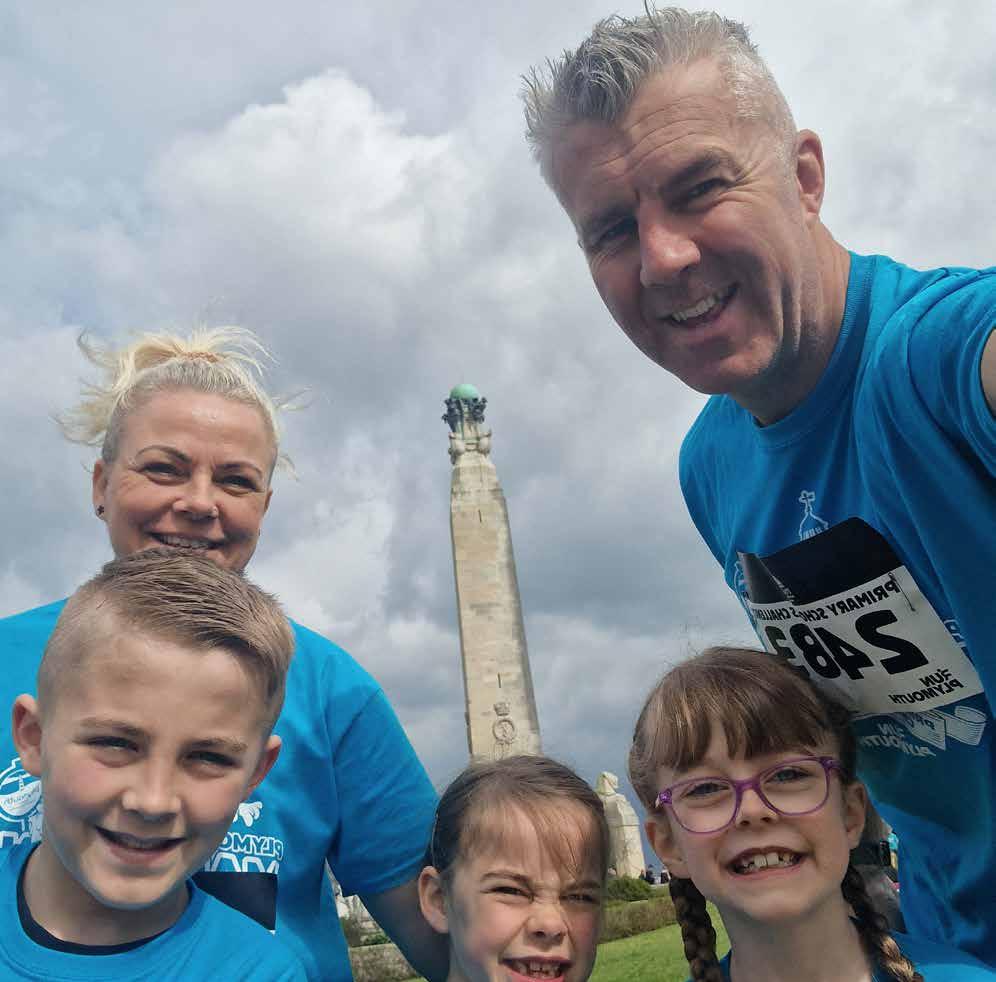
Legal and administrative information
Patron:
His Majesty The King
Trustees:
John Baines, Chair
Neil Gibbins, Deputy Chair
Chris Bilby
Deborah Christie (appointed 31 July 2025)
Peter Connolly
Shantha Dickinson
Michael Graham
Ross Haggart
Chris Hirst (resigned 21 November 2024)
Steve Jamieson (appointed 31 July 2025)
Karen McHugh (appointed 31 July 2025)
Simon Routh-Jones
Roger Thomas
Steve Tolan
George Wood
Fire Fighters Charity is a company limited by guarantee.
Registered in England Number: 4480058
Charity Registration Number: 1093387
Scottish Charity Registration Number: SC040096
Isle of Man Charity Registration Number: 1363
Isle of Man Company Registration Number: 006421F
Senior Leadership Team:
Chief Executive
Jill Tolfrey (to 31 May 2024)
Sherine Wheeler (from 22 April 2024)
Director of Finance
Martin Smith (to 16 August 2024)
Steve Hollock (16 August to 4 October 2024)
Lizzie McGilveray (from 24 September 2024)
Director of People, Governance and Compliance
Christine Goonan (to 19 September 2025)
Director of People & Learning
Jo Gouldthorpe (from 8 September 2025)
Director of Services
Sharon Bailey
Director of Impact & Service Partnerships
Joss Gaynor
Interim Director of Engagement & Fundraising
Andrew Gould (to 13 November 2024)
Director of Fundraising
Ellie Rocks (from 5 November 2024)
Director of Engagement
Ashley Fryer (from 12 November 2024)
Director of Business Development, Estate & Facilities
Richard Jenkins (from 1 September 2024)
Director of Digital, Data & Technology
Mike Robinson (from 17 March 2025)
Headquarters and registered office:
Fire Fighters Charity
Belvedere, Basing View, Basingstoke, Hampshire, RG21 4HG
Tel: 01256 366566
Web: www.firefighterscharity.org.uk
Our Centres:
Marine Court, Fitzalan Road, Littlehampton, West Sussex, BN17 5NF
Jubilee House, Eamont Park, Eamont Bridge, Penrith, Cumbria, CA10 2BN
Harcombe House, Chudleigh, Devon, TQ13 0DG
Retirement Homes:
Marine Court Flats, Fitzalan Road, Littlehampton, West Sussex, BN17 5NF
Eamont Park Retirement Homes, Eamont Bridge, Penrith, Cumbria, CA10 2BN
Auditor:
HaysMac LLP, 10 Queen Street Place, London, EC4R 1AG
Investment Managers:
Newton Investment Management Limited, 160 Queen Victoria Street, London, EC4V 4LA
Bankers:
Barclays Bank PLC, 4th Floor, Apex Plaza, Forbury Road, Reading, RG1 1AX
Custodians:
Bank of New York, 1 Canada Square, London, E14 5AL
Patron: His Majesty The King.
